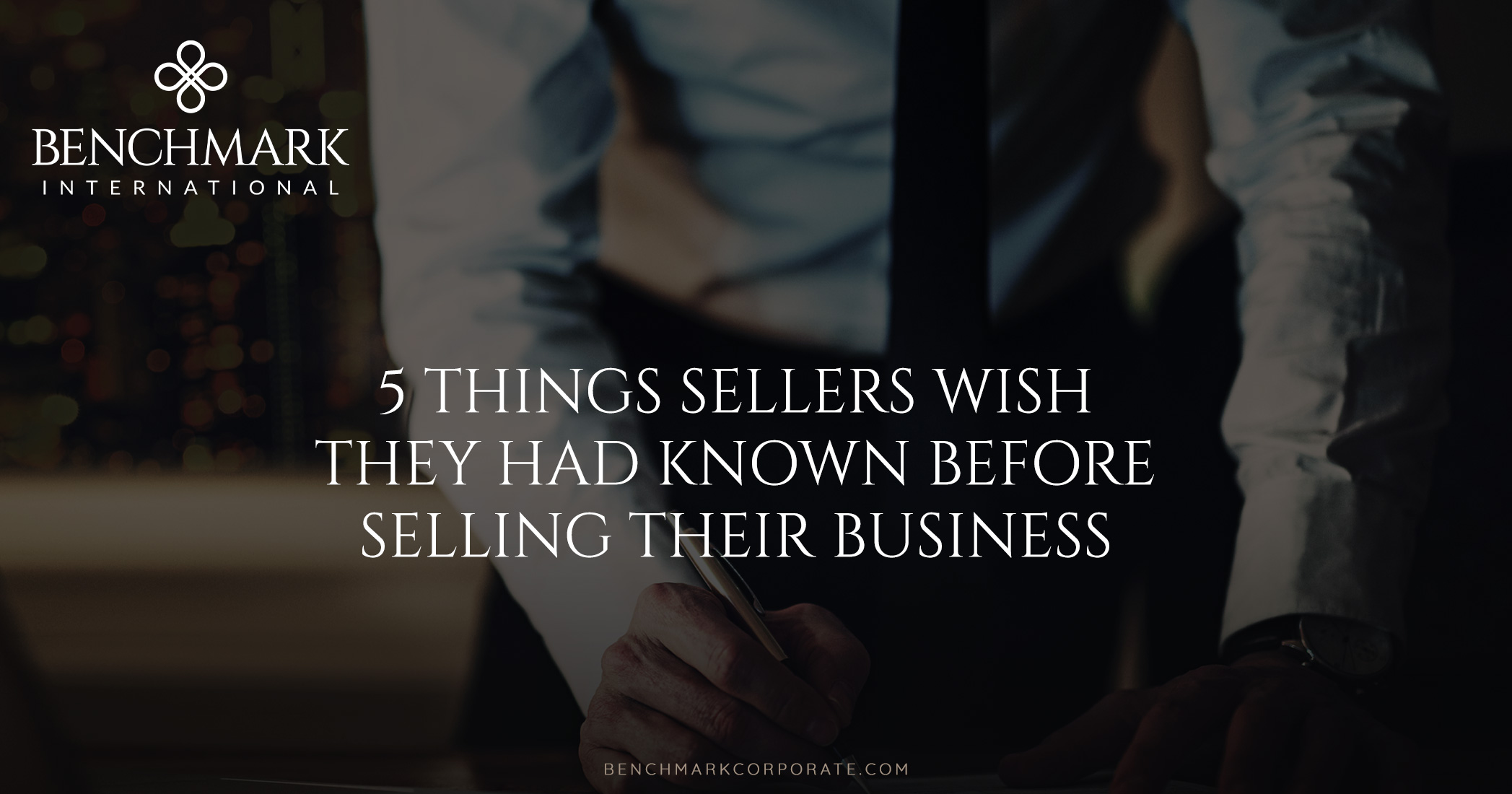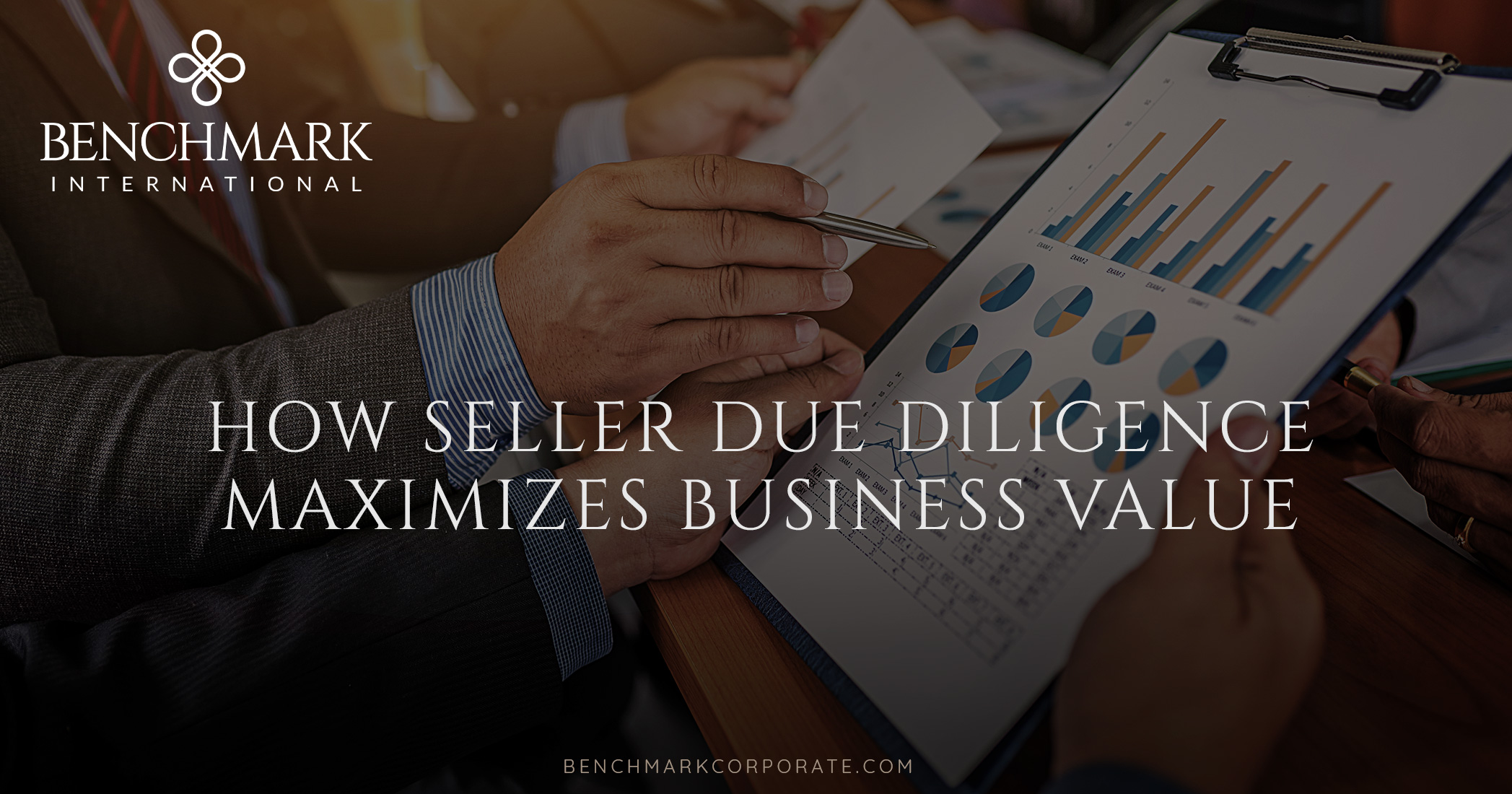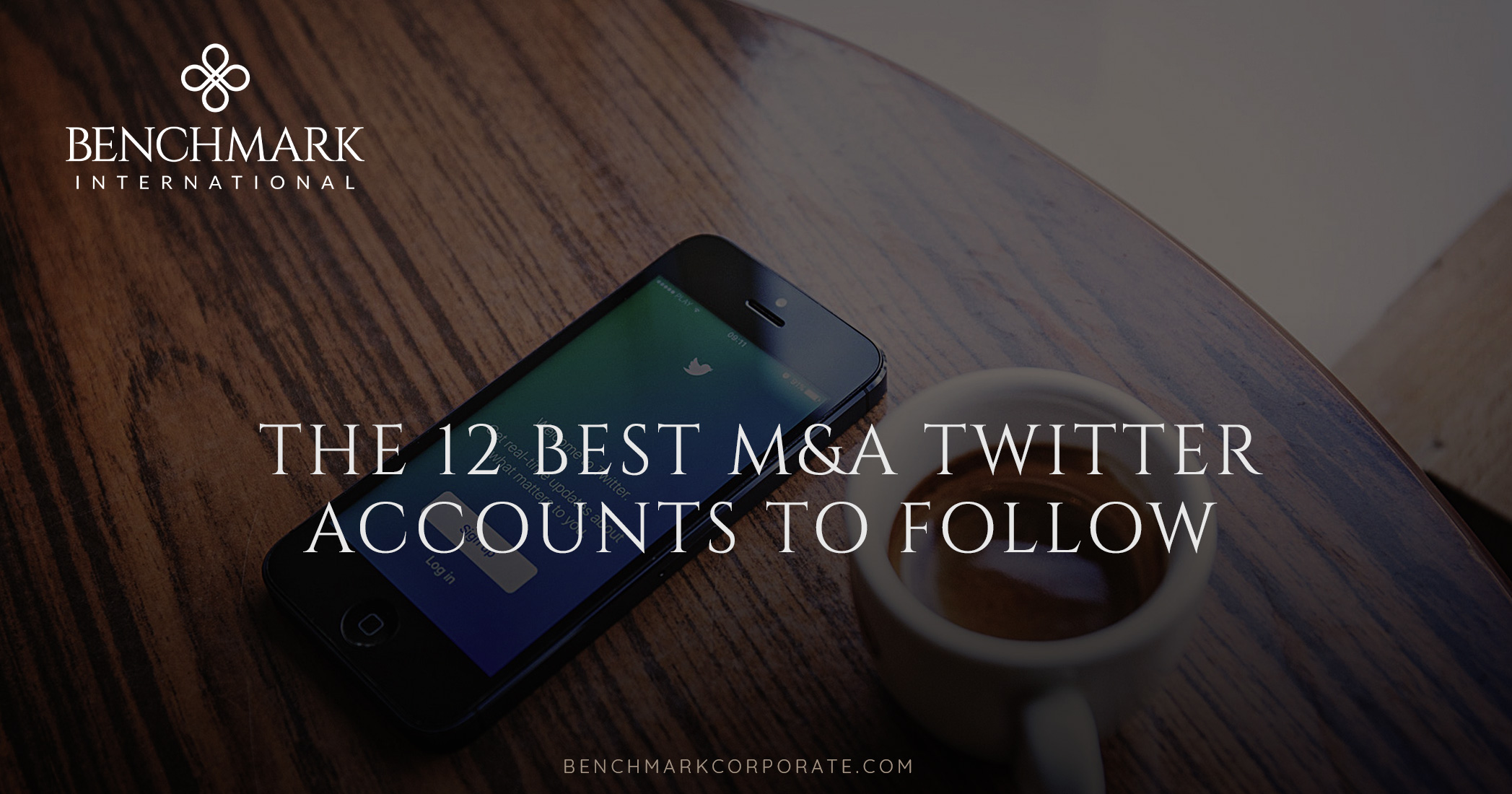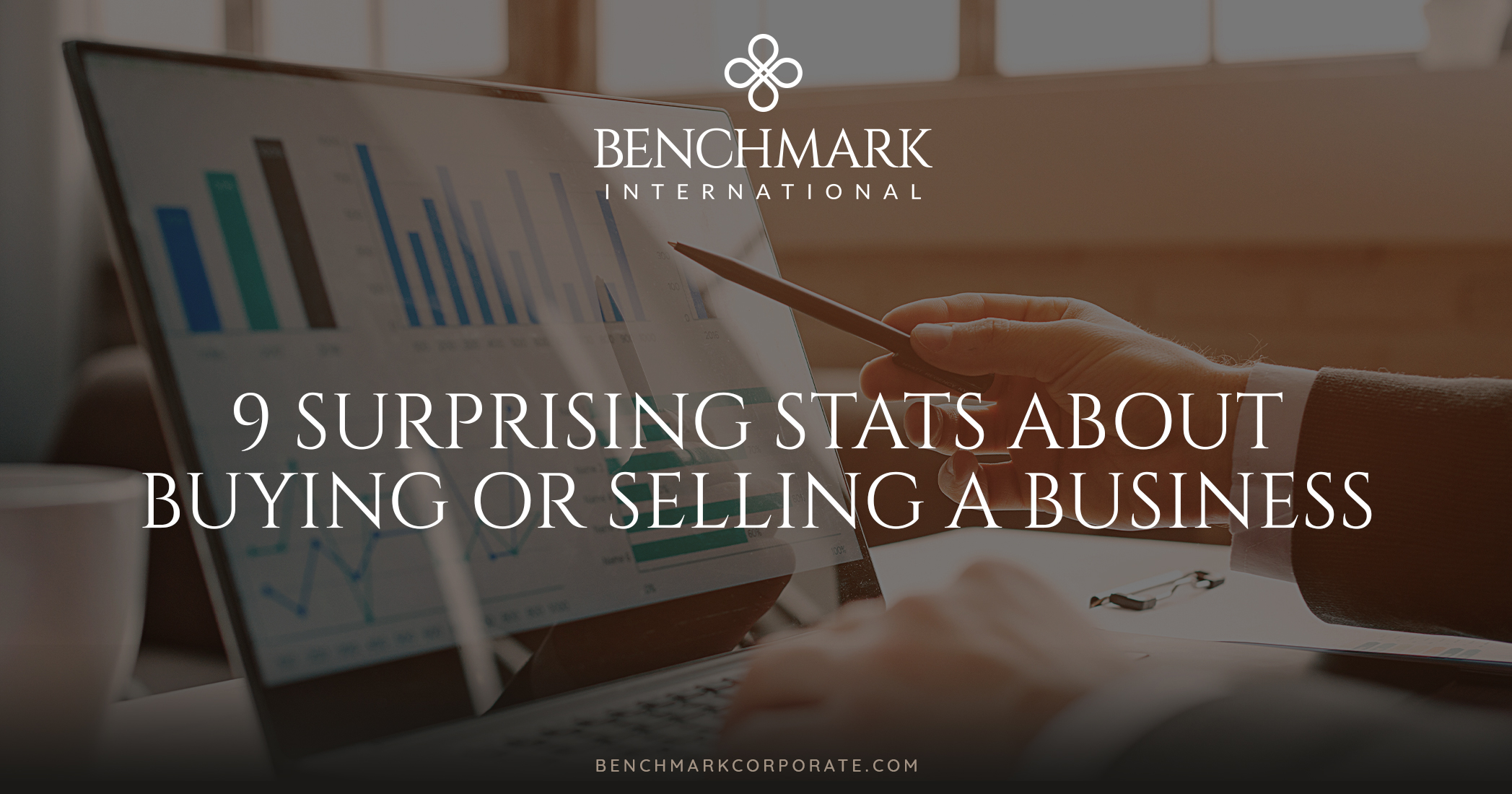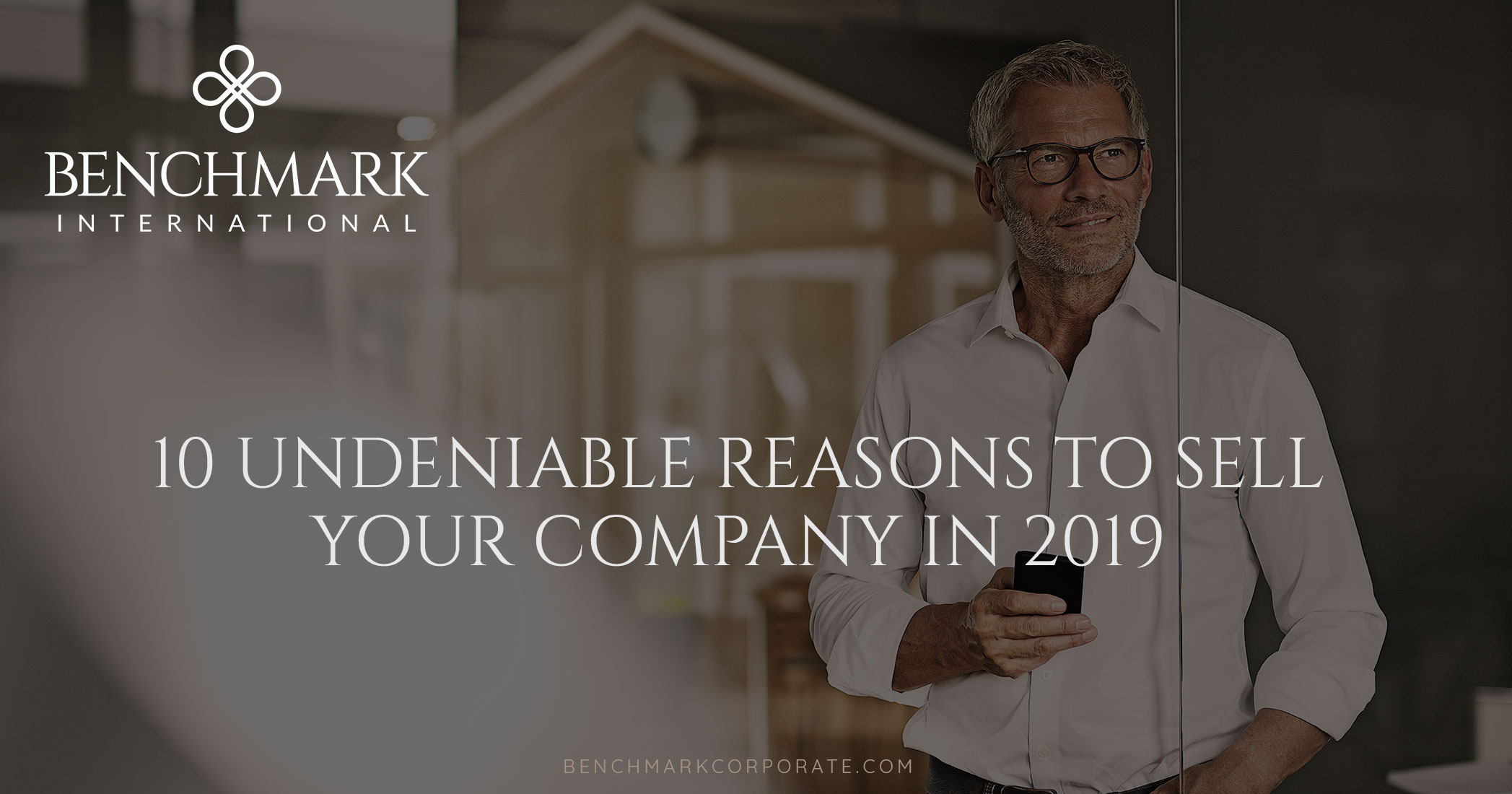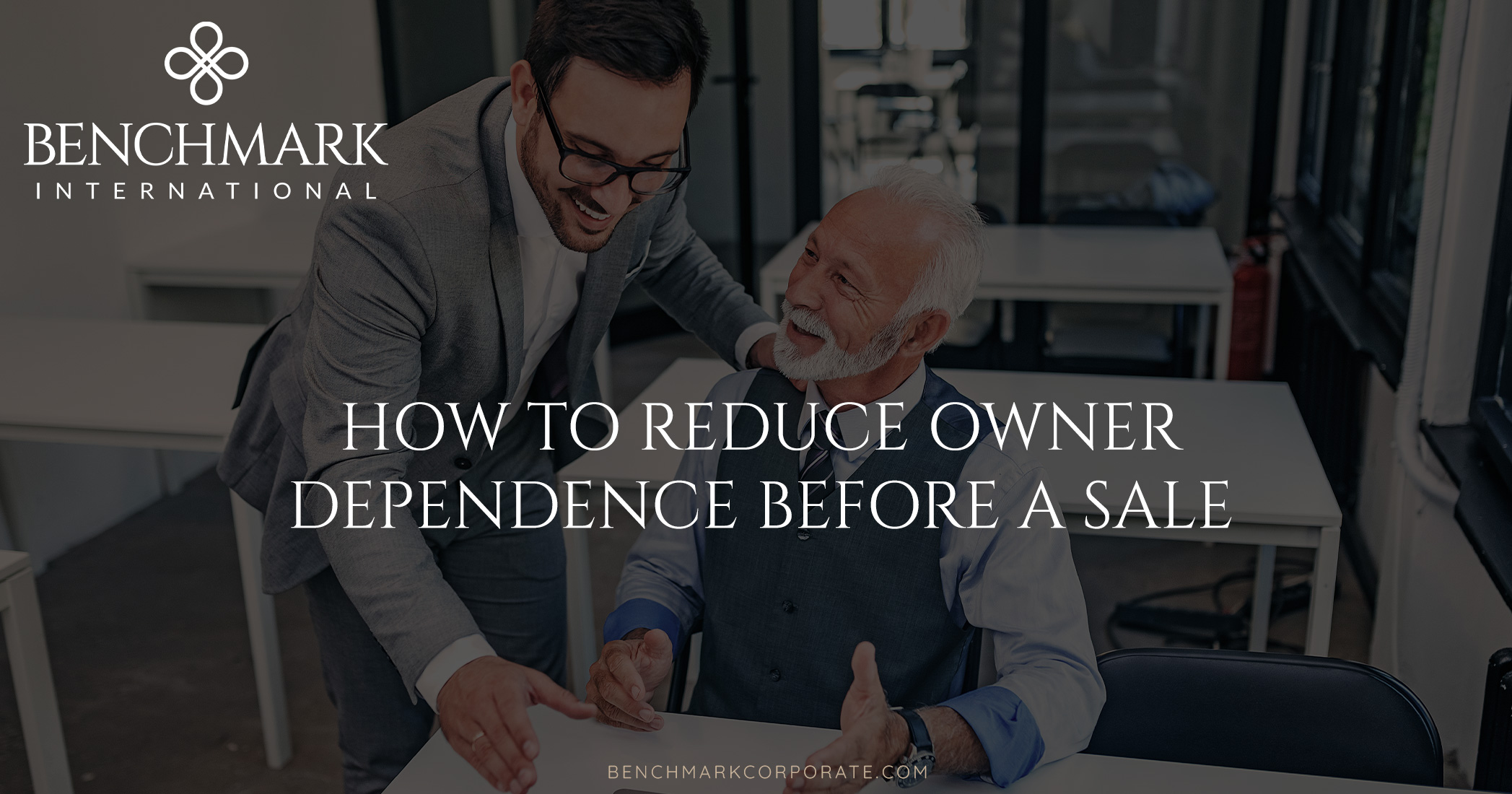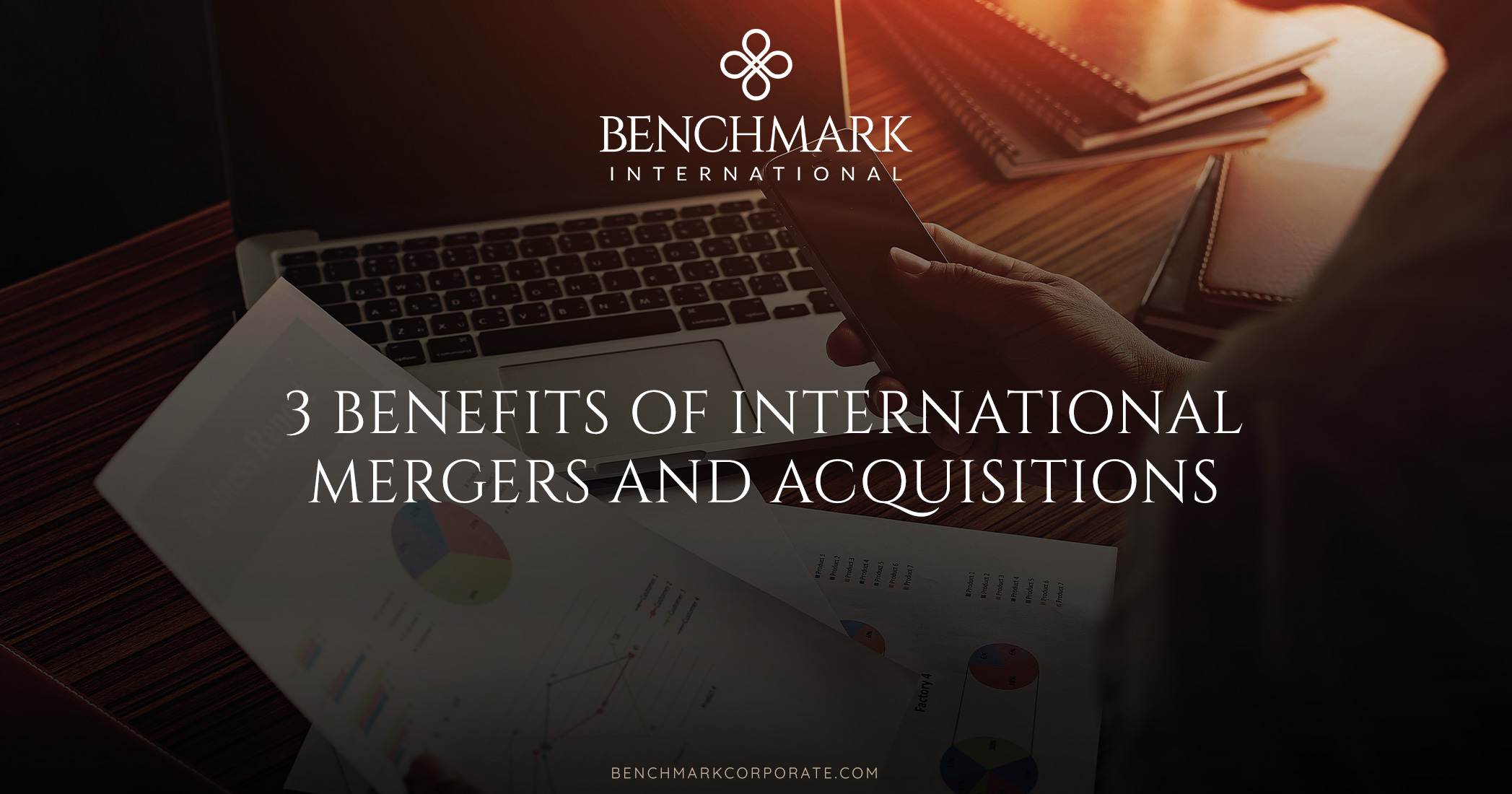The global print market is shrinking in volume but growing in value. Output measured in billions of A4 prints was 49,973 back in 2014 but is forecast to decline very slightly to 49,654 by 2024. In value terms, print output is expected to grow from a total of $767.4 billion in 2014 to $862.7 billion in 2024 – a CAGR of 1.18%.
The role and dynamics of the print industry are changing, with the main factor being the impact of the internet and mobile connectivity on the way both businesses and individuals communicate and access information. This affects every segment of the traditional printing business, changing expectations of what is acceptable to speed, relevance, and degree of interactivity of data, irrespective of the medium used.
Archives
Global Printing Industry Outlook
Benchmark International's Three Key Philosophies for Getting Deals Done
As we work exclusively in the mid and lower-mid markets, we see many deals succeed, and some wither. In an effort to have more of the former and less of the latter, we would like to share our core philosophies with the belief that helping you understand them will make working with us a more rewarding experience.
1. Time kills all deals.
Prudent and deliberate action are certainly also key aspects of getting deals closed but, in our experience, neither buyers nor sellers are inclined to be under-prudent or lacking deliberateness. Rather, unexplained and avoidable delays tend to stack up between the first meeting and the closing. Each delay shaves off a small percentage from the probability of closing. There are enough legitimate delays in the M&A process. When we see one that can be avoided, we will step in and attempt to get the ball rolling once again.
2. Transparency is the best antiseptic.
We’ve seen too many deals die because one side or the other has hidden something until it is too late. Long before you meet our clients, we will have already guided them on the value of releasing the troubling issues they might have at the earliest opportunity. Hopefully, you will already have seen some of this in our Confidential Information Memorandums. We lean forward into these issues because we believe that the sooner they are addressed, the more solutions there are, and the less likely anyone is to feel hoodwinked. We hope you’ll feel the same way with your own challenges (for example, lining up debt financing) as well as any you may see with our clients.
3. The emotional must be covered as well as the financial.
This may be somewhat unique to our clients as our process appeals to a certain owner type. As you probably know, we specialize in closely-held and owner-operated businesses. Nowhere is it more true that “every business is a family business.” Our clients have typically had 20- to 30-year relationships with their businesses and often equate the sale process to sending their son or daughter off to college. When we work with acquirers that understand the effects of this fact pattern, we see a much higher level of success. In fact, we have built our teams, our process, and our engagements around it. We will be more than happy to help you deal with this interesting aspect of our clients. Please just ask.
Author
Clinton Johnston
Managing Partner
Benchmark International
T: +1 813 898 2350
E: Johnston@benchmarkcorporate.com
READ MORE >>
Share this:
How & When To Explain To Your Employees That You Are Selling Your Business
You’ve decided to sell your company, but when is the right time to tell your employees? And what is the right way to tell them? The conversation may not be easy, but if you follow a few simple guidelines, you can ensure that you handle it to the best of your ability.
Have a Plan
You should already have an exit strategy in place when you are selling your business, but that is your own personal exit plan. You should also think about how the process will affect employees. Develop a clear timeline of how you expect the deal to progress and when you will meet with your staff about it. You do not want to come across as confused and unsure about the process. The more confident you are in explaining it, the more confident they will be about it being a good plan for them as well. You may also want to consider when to introduce the new owner. By having the staff meet the new boss, you can dispel a great deal of anxiety. The best time to do this is AFTER the deal is done, in the event that the deal falls through. Otherwise, you are introducing them to someone irrelevant, adding confusion and instability.
Wait Until the Deal is Done
It can be tempting to share your plans with employees early in the process. But if you disclose your plans too soon, you are opening yourself up to risks that can tank a deal. Employees can get scared into finding another job. Vendors and clients can get nervous and jump ship. These are all scenarios that are not in your best interest, as the health of your business is an essential aspect of a sale. By waiting until a deal is in place, you can avoid telling your employees false information when things are still subject to change.
Depending on the size of your business, you will likely want to inform key management before telling anyone else in the organization. They are going to need to fully understand the transition because you are going to need their support. They can help you maintain clarity when employees go to them with questions. If management is clear on what is going to happen, they can keep employees calm and properly informed.
Be Accessible
Once you’ve made the announcement, you must remain proactive in answering employees’ questions. It can also be important that they hear any news directly from you versus rumors around the water cooler.
Provide Written Communication
By creating a document that outlines pertinent points about the deal and the transition, employees can reference it following the announcement if they do not recall something. It also provides them with something concrete so that you are not leaving details up to their imagination.
Do Not Overpromise
Once you sell the company, you will no longer have control over what happens in the day-to-day business operations. It is important to express to your employees that you care about their futures and that you took the proper steps of protecting them when brokering the deal with the new owner. However, you want to avoid making promises that you will not be around to honor.
READ MORE >>Share this:
Wind Power and M&A
Renewable energy transactions are on the rise as the demand for clean, sustainable energy grows around the world. Europe in particular has seen a surge in investments into wind power as big oil and gas companies try to shift to renewables. And there is significant competition in North America for high-priority assets. Both offshore and onshore wind investments are relatively safe as far as mergers and acquisitions because demand continues to rise in emerging markets as the worldwide weaning off of fossil fuels is certainly not going to happen overnight.
The wind energy industry is still relatively young to the world. There remains plenty of opportunity for technological and design advancements, as well as how they relate to financial possibilities.
Offshore wind in particular has inherent benefits. Because it is located out at sea, the visual impacts are minimized. Also, wind tends to be stronger and more consistent at sea then it is on land. It is highly sustainable and highly predictable. Floating turbine foundations for deep-water locations are emerging and have already been successfully implemented in countries such as Norway, Japan and Portugal.
Wind and Large-Scale M&A
Wind power transactions dominate large-scale renewable mergers and acquisitions because of the sector’s economy of scale. The larger a windmill is, the more efficient it is. So, one big windmill is more efficient than two smaller windmills. This translates into large construction projects—an attribute that the industry likes to see. Large corporations with bold goals for renewable energy are buying an abundance of wind power.
Innovations in wind energy make it more affordable, setting the stage for demand and growth, especially for large corporations that need a great deal of power and are looking to save money. (Think about Amazon’s huge wind farm in Texas that has 100 turbines and can power 90,000 U.S. homes). This corporate need calls for large projects and contributes to why wind power dominates large-scale M&A.
The Role of Tax Equity Investments
The wind energy industry is also subject to tax equity investing—a very important part of financing in the sector and popular in the United States. Tax equity deals for renewable energy projects are common with private energy developers seeking to extend capital, and financial institutions wanting credits to ease their tax liability.This can make the environment more competitive.
How it works:
- A tax equity investor and a developer create a holding company that owns the project's assets. The financial institution provides capital and in return gets tax benefits and cash distributions within the first 10 years of the project’s operation.
- This allows the investor to recoup and earn on their investment.
- Once the investment is recovered and tax credits captured, the ownership structure is reversed.
- The developer is now the majority owner and can have the right to buy out the investor's remaining stake.
- Therefore, the developer built a wind project for a small part of the installed cost in exchange for relinquishing the tax credits and cash distributions to the investor.
Clean Energy M&A Expertise
Any energy M&A transaction requires a specialized level of expertise in order to avoid pitfalls that can blow a deal. Finding the right company broker is advised.
- Knowledge of the industry and the nature of the markets are key
- The ability to identify areas of risk is imperative with painstaking due diligence
- Complex regulatory issues must be firmly understood. Laws and regulations in the energy industry go beyond the energy regulatory governance to include environmental, health, safety, tax, employee benefits and property issues
- Cross-border transactions require global and local understanding of the market and the regulatory differences and how it plays into the company valuation
Contact Us
Ready to make a move? Schedule a consultation with one of our M&A geniuses to see how we can help you sell a company, buy a company, create growth, or conduct exit planning.
READ MORE >>Share this:
5 Things Sellers Wish They Had Known Before Selling Their Business
You’ve decided to sell your business. Congratulations! Whether you are retiring, looking to embark on a new business adventure, or wanting to hand off the reins and take a different role in the company, the process of selling a business can be a trying one without the correct preparation and support. Fortunately for you, you can learn from other entrepreneurs who have been in your shoes and have shared the five things that they wish they had known before selling their business.
1) Neglecting to perform pre-transaction wealth planning can result in you potentially leaving a lot of money on the table. Before you sell, consider your family members’ wishes and concerns. Communicating with family members before the sale can help ensure smooth sailing through the deal negotiations. Effective tax-planning to support family members’ needs, philanthropic plans, or creating family trusts can help increase the value gained from the transaction.
2) Don’t underestimate the importance of a good cultural fit with a buyer. While the price is always at the forefront of a sellers’ mind, cultural fit can mistakenly be pushed to the back burner. One of the many things that you have worked hard to create in your business is the employee culture. Most likely, you want to see the close-knit “family” that you have built continue when you are no longer working there. Benchmark International understands that and will help you find that partner. We remain committed along with you to your goal of finding a buyer who will carry on your legacy.

3) Skimping on your marketing materials does not pay off in the long run. With confidentiality being of the utmost importance, how can you engage buyers without them knowing who you are? Preparing a high-quality, 1-2 page teaser that provides an anonymous profile of your business is the tool used to locate a buyer confidentially. This is followed by the Information Memorandum, with an NDA that is put in place for your protection. Benchmark International will prepare these high-quality documents and put your mind at ease.
4) Sellers wish they had known how detail-oriented the process would be, how many documents would be needed, and how labor-intensive each phase would be. One of the most crucial pieces of advice that the majority of sellers wish they had known is that you need to have a team. Sellers need to continue running their business as they were before, or operations can really start to slow. The last thing you want is for the value of your company to take a nosedive because you are investing all of your time into a transaction. With the team at Benchmark International as your partner dedicated to the M&A process, you will be free to continue to focus on the growth and operations of your business. We will handle the details for you.
5) Finding a like-minded partner can give a seller a false sense of security that the transition from two companies to one will be easy. You need a trusted advisor that will help you navigate the complexities of integration, giving you insight on some of the other intangibles that need to be negotiated. Those intangibles include the details of your role after the sale, employment contracts, earnouts, etc. With Benchmark International’s vast knowledge and experience in M&A deals, we know what is usual and customary to request throughout the negotiation process and will bring more value to your transaction.
Congratulations again, this is an exciting time for you! With the right partner, it can be a smooth and profitable process as well. Benchmark International has a team of specialists that arrange these types of deals every day. We can answer your questions and help you determine what is best for you, your business, and your exit plan. A simple phone call or email to us can start the process today and move you one step closer to accomplishing your goals.
Author
Amy Alonso
Associate
Benchmark International
T: +1 615 924 8522
E: alonso@benchmarkcorporate.com
READ MORE >>
Share this:
Where Will Lower-middle Market M&A Be In A Year From Now?
The Current Market
The lower-middle market has remained positive for sellers in 2019, thanks to an abundance of buyers that are giving sellers the leverage to demand favorable terms. Most business sectors are seeing strong profits, and the bullish optimism of large-cap investors has spilled over into lower and middle markets. This has resulted in heightened interest and aggressive valuation and buying from private equity firms.
There are several patterns have carried over into 2019 from a very active year in 2018.
• M&A activity has been especially strong in the healthcare and technology industries.
• Acquisitions remain a popular strategy for companies needing talent to keep up with growth.
• Buy-and-build strategies are proven to be working.
• Emerging markets are being attractively valued, especially in the Asia Pacific region.
• Competition for high-quality targets is intense, particularly for businesses that are owned by the rapidly growing retiring population.
• Small business confidence is strong, resulting in increased investment by owners.
What Lies Ahead
The world faces potential changes in the political landscape as the United States 2020 presidential election nears, Britain is under new leadership through the Brexit transition, and the global economy navigates significant political unknowns in the wake of trade deals and tariffs. However, the United States election takes place near the end of 2020, which could possibly stave off any significant effects on the economy until the year 2021.

While no one can ever be certain what the future holds, we still see the benefits of a strong year midway through 2019, yet the lower-middle market has the potential to become more complicated in 2020. The current bullish market is strong but is expected to lose momentum based on the average amount of time that historical highs have been proven that they can be sustained. Many experts warn of a downturn in the economy next year, predicting that a recession is looming. In contrast, some experts expect M&A activity to remain robust regardless of the economy.
Obviously, uncertainty in the marketplace can impede M&A activity. But a recession does not necessarily mean that selling will be impossible. The variables that drive lower-middle market M&A include:
• Lending capacity: The less money a buyer can borrow, the less money they may want to spend.
• Cost of capital: The cheaper a buyer can borrow, the more money they may want to spend.
• Buyer access to equity capital: Strong profits and surplus cash motivate activity.
• Supply and demand for deals: Aging populations entering retirement and business succession plans, strategic buyers focusing on growth, etc.
In the lower-middle market, buyers and lenders both tend to stay much more disciplined regarding their willingness to lend, cost at which they lend, and returns they target. Buyers will be seeking targets with stability, limited cyclical exposure, a business model with recurring revenue, and a history of performing well through a recession.
Should You Sell Now?
The good news is that there is still time before a possible slump in activity and optimism. If you are looking to sell your business, you may have another 12 to 18 months to benefit from the premiums today’s sellers are getting. Keep in mind; it does not mean that after this time is over, you will not be able to sell. Companies are always looking to grow through acquisitions, and the market is always changing. You do not need to feel completely discouraged by any economic slowdown.
Consider how long you are willing to wait to sell your business if the market were to drop. If you do not plan to sell within around five years or more, you can wait patiently for the next market rebound. But if you are determined to sell in the next couple of years, it may be wise to get serious about your exit strategy while conditions are still favorable. Think about what is right for you, your business, and your family when deciding when to make a move.
Contact Us
Our business acquisition experts at Benchmark International can offer exit planning advice and help you plan a solid transition for your company. We will use all the tools at our disposal to get you the maximum selling price while preserving your vision for the future. We can also help if you are looking to buy a business. Contact us today.
READ MORE >>Share this:
15 Smart Tips On Exit Planning
15. Decide the Company's Future
Before planning your exit strategy, you must decide the future course for your business. Do you plan to sell outright? Would you prefer that the company stay within family ownership? Do you want to retain a percentage stake in the company? Is there an employee that you would want to take over? Could a merger or an acquisition be the best move? This is a key decision to consider before embarking on your exit plan.
14. Set a Date
It's never too early to think about when you plan to retire. This need not be an exact date on the calendar, but you should establish a ballpark timeframe that you would like to put the wheels in motion for your exit. Having an idea of the timing will help you get the process started at the right time, whether it's two years from now or 20 years down the road, especially because most transactions take time.
13. Plan for Continuity
If your business will be changing hands when you retire, you should have a solid plan in place for maintaining the continuity of the company's operation. Both employees and customers alike will need to feel that the future is secure, and you should be able to reassure them through a clear strategy for the transition.
12. Use Diversity to Minimize Risk
The more diversity you have in your client and supplier bases, the more attractive and less precarious your business will be to potential buyers. They are going to need to have confidence that the business can grow, rather than falling apart if the sale results in the loss of one or two key clients.
11. Think Big Picture
It is not uncommon for a business owner to get wrapped up in the day-to-day details of running the company to the point where they lose sight of the bigger picture. It is a good idea to take a step back and consider where you want your business to be in the future, how you plan to get it there, and when your exit fits into that plan.
10. Create Your Dream Team
Having a strong management team in place is crucial to any successful exit strategy. Whoever is taking the reins is going to be a significant factor whether you are selling the business to an outside party or bequeathing it to family or an employee. It will also help you rest easier about leaving the company in someone else's hands.
9. Get Your Financials in Order
Before you can broker a sale or transfer ownership or control, you will need to organize financial statements, valuation data, and other important documents about the business. If you are planning to sell, buyers will expect to see thorough documentation about the business operations, profits, losses, projections, liabilities, contracts, real estate agreements (pretty much anything and everything regarding the company).
8. Know Your Target
If you plan to sell your company, you are obviously going to want a buyer who has the financial capacity to take on your business. But money is not the only thing that you should be seeking. You want a buyer who shares your values and your vision for the company. They also should possess the right skill set to maintain the company's success and even grow that success. You should not waste your time with a prospective buyer that doesn't have the chops to take the business in the right direction.
7. Always Listen
Even if you feel it is too soon to sell and someone is reaching out to you, it is always wise to hear him or her out. It could result in a meaningful relationship that can be beneficial in the future. They could also reveal some things about your company that you have not yet considered, sparking new ideas and opportunities in the realm of business acquisitions.
6. Devise Practical Earn-outs
If you plan on getting additional payment as part of the sale of your business based on the achievement of certain performance metrics, be realistic about setting these goals. Falling short of these targets can result in less money for you and enhanced leverage for the buyer.
5. Get Your Tech in Order
Today nearly everything is powered by technology. You use it to help you get organized, but you also run the risk of letting things fall through the cracks. Think about all the logins and passwords that give you access to things that run the business. Establish a plan to streamline your tech while keeping it secure for a transition in management. There are enterprise cyber-security management solutions that can assist with these matters.
4. Know Your Number
Have you asked yourself, "What is my business worth?" When you understand the precise valuation of your business, you will be able to ascertain the difference between a fair sale and a bad deal, and get the money you deserve. This includes a company analysis married with a market analysis. You should enlist the help of an M&A expert to determine the valuation of your business accurately. It is worth it to ensure that you get your maximum value.
3. Put it on Paper
Having the proper paperwork drawn up for legal purposes is important in the event that something were to happen to you so that you can convey your plans and wishes for the business. The task of creating this safety net will also help you plan more clearly for the future. Sometimes there are details you may overlook until you go to put it all on paper. You should outline your plan and make sure any necessary signatures are on file.
2. Assess the Market
Markets fluctuate and can change at any given time. But if you carefully evaluate your industry's outlook and growth projections, you can time your exit strategy for when you can get the most value for your company. If the outlook is not trending toward optimism, you can take the time to consider how you can bolster the value of your business and make it more desirable in the future.
1. Partner With an Advisor
Valuating and selling a company is not easy. Neither is planning an exit strategy. Seeking the help of experts such as an M&A advisory firm can take an enormous weight off of your shoulders. It can also ensure that the exit process goes smoothly, stays on track, and achieves your specific objectives for both you and the company.
Benchmark International can help you establish your exit strategy and broker the sale of your company so that you get every last penny that you are worth. Call us to get the process started. Even if you are not 100% sure that you are ready to plan your exit, we can help you devise strategies to grow your business in the meantime.
READ MORE >>Share this:
Selling Your Business: Expectations vs. Reality
When business owners begin the process of selling their business, they may have expectations about the sale process. These expectations can be based on what they have read, what their friends have told them, and what their own needs are. However, the reality of selling a business can be very different from the expectations.
Timing
Sellers tend to think that a buyer will appear at their doorstep ready to transact a deal when, in reality, that is not the case. The sale of a business is a very time-consuming process. M&A transactions can take anywhere from 6 months to a few years to complete, pulling a seller away from the company, which can affect the financial performance and valuation of the business. Hiring an M&A advisor can help take some of the time burdens off of the seller.
Buyers
In our experience, it never surprises us who the buyer is at the end of the day. However, many sellers believe that their perfect buyer is international or a larger company. Again, this is not the reality of it. The ideal buyer may be right down the street or even a member of the seller's management team. When considering selling a business, a business owner needs to seek an advisor or sale process which will provide them with options when it comes to buyers. Not only does this drive up valuations, but it also allows the seller to choose the buyer that is the best fit for their company.

Business Condition
Sellers often assume that their business needs to be in the perfect shape to sell it. Sellers will typically share that they want their business to show year over year growth or a more diversified customer base. While these changes might make the business more attractive to the market, buyers buy companies for different reasons. For example, if a buyer is seeking to acquire a company to gain a relationship with a particular company, then that buyer will see a concentrated customer base as a good thing. Also, sellers will work hard to groom their business and miss out on opportunities within the open market. They work for years to grow their business, only to have the market shift and have their business not gain any additional value. The best tie to sell a business is now. We understand what's going on in the market, both from a micro and macro level, and we are not trying to predict the future.
Answer to Questions
The sale process can be very nerve-racking for sellers because of the unknowns. Sellers often expect their advisors and or buyer will be able to answer all of their questions. However, this is not the case. The sale process is just that, a process. Business owners need to go through the process to discover all the answers to their questions. Buyers are eager to get sellers comfortable with deals, integrations, and any other areas of concern for sellers. An M&A Advisor will be able to guide sellers on when they should have answers to their questions. If the answers are unknown, the M&A advisor can help guide the seller to provide comfort based on the advisor's experience.
Deal Structure
A lot of sellers assume that the majority of deals are structured as all cash transactions. All cash transactions mean when the sale closes, the seller will receive his or her money, and the buyer gets the key to the operations, allowing the seller to leave immediately. However, this scenario is a rare occurrence. Typically, a seller is required to remain with the company for 3-5 years to help with transitioning the business. Sellers in lower middle market deals tend to be critical to their company because processes are rarely formalized, and the relationships that sellers hold are key. Given the time frame for a transaction, the buyer will want to incentivize the seller to remain motivated post-closing. To achieve this goal, the buyer will want to structure the deal so that the seller has an interest in the smooth transfer and future success of the business.
Author
Kendall Stafford
Managing Partner
Benchmark International
T: +1 512 347 2000
E: Stafford@benchmarkcorporate.com
READ MORE >>
Share this:
Should You Hire An M&A Advisor To Sell Your Business?
That’s an easy answer. YES! You absolutely should hire an M&A advisor to sell your business. Here’s why.
It’s Not Easy
The process of selling a company is guaranteed to be complicated. While an accomplished attorney or accountant can help, you are going to need a true expert intermediary to handle the entire venture if you are serious about selling and getting the best possible deal.
Consider the seemingly endless amount of work that needs to be done.
• Data and documentation must be produced and organized, stretching back several years to a decade. This is going to include financials, vendors, contracts, and so much more. Do not underestimate how overwhelming the paperwork will be.
• Potential buyers will need to be identified and vetted. A good M&A advisor has access to connections and a knowledge base that you would otherwise never have, opening up an entirely new realm of potential buyers. This process will include a fair share of phone calls, emails, and face-to-face meetings, all of which add up to be very time-consuming.
• You are going to need an experienced negotiator that knows how to maximize your business value and lay the groundwork for getting you what you want. This means knowing how to push a deal forward while providing you with peace of mind that things are on the right track. This also means creating a competitive bidding landscape.
Get Peace of Mind
Selling your business is not a process that should be taken lightly. Countless decisions will need to be made. Consider the reality of what is going to be required and embrace the fact that you cannot shoulder the burden and run your company. Make sure you can sleep at night. Find an M&A advisor that will find you the right buyer, deal with the minutiae, and get the job done—all while sharing your vision for the company, as well as your exit strategy.
They Can Get You More Money
It is also important to note that an M&A advisor is more likely to get you more money. Research shows that private sellers receive significantly higher acquisition premiums when they retain advisors, in the range of six to 25%. Additional research shows that 84% of mid-market business owners who hired an M&A advisor reported that the final sale price for their business was equal to or higher than the initial sale price estimate provided. After all, they know how to value a company properly.
Another benefit of having an M&A advisor is that it shows buyers that you are a serious seller. As a result, hiring an M&A advisor can help drive up your company valuation and get you more favorable terms.

What to Look for in an M&A Advisor
Enlisting the guidance of the wrong advisor can be disastrous. The last thing you want is to end up in negotiations with someone who does not have your wants and needs in mind at all times. Even worse, they can slow down the process and cost you a fortune. When making this decision, know what to look for:
• You want an advisor that understands you, your company, and what you expect to achieve from the sale.
• Consider their experience in your sector, as well as their geographic connections, and how that can work for your business. Global connections are especially helpful. And do they usually work with businesses that are around the same size as yours?
• They will adequately prepare you and manage your expectations.
• They will work diligently to find the RIGHT buyer, not just the easiest or the richest.
• They should be honest, and you should trust them because they have demonstrated that they are worthy of it.
• Their track record will speak for itself. A quality business acquisition advisor is going to have a proven reputation, client testimonials, credentials, and accolades.
• Also, ask if they use any proprietary technologies or databases and how it helps them gain insight into specific industries.
Take your time in evaluating potential advisors. A good firm will patiently accommodate your process. You are going to be working closely with them through a grueling journey, so you will want to feel comfortable with their team and confident that they will work around the clock to get you the most favorable results possible.
Share this:
6 Books About Growing A Business That You Should Read
By Paul Hawken
In this book, Paul Hawken explains how a successful business is an expression of the individual behind it, along with practical advice, common sense, and down-to-earth ideas. Even though it was written 30 years ago, it remains an excellent and very relevant read, backed by the fact that the author’s own companies are still successful after all these years.
Organizational Physics - The Science of Growing a Business
By Lex Sisney
The author of this book spent more than a decade leading and coaching high-growth technology companies. In his work, he discovered that companies that thrive do so in accordance with six universal principles. The book covers a blend of important business and entrepreneurial topics in a manner that stands out from other business books.
Profit First: Transform Your Business from a Cash-Eating Monster to a Money-Making Machine
By Mike Michalowicz
In this book, the author offers principles to simplify accounting and easily manage a business through analysis of bank account balances. The theory is that a small, profitable business can be more valuable than a large business surviving on its top line, and those that achieve early and sustained profitability have a better chance of maintaining long-term growth.
Explosive Growth: A Few Things I Learned While Growing To 100 Million Users - And Losing $78 Million
By Cliff Lerner
This best seller provides step-by-step instructions, case studies and proven tactics on how to explode business growth. It reveals the detailed growth frameworks that propelled the author’s small online dating startup to grow to 100 million users while coupling humorous storytelling with concrete examples.
Traction: How Any Startup Can Achieve Explosive Customer Growth
By Gabriel Weinberg
Traction is based on interviews with more than 40 successful business founders about their real-life successes. It covers 19 channels that can be used to gain traction for a business, and how to select the best ones for your company. The book discusses topics such as targeted media coverage, effective email marketing strategy, and online search optimization.
Growing Influence: A Story of How to Lead with Character, Expertise, and Impact
By Ron Price and Stacy Ennis
Growing Influence is packed with relatable human experiences and practical advice on developing the right leadership skills. It chronicles two main characters’ growth as they applied the principles in the book, mixing solid business advice with a novel that is fresh, timely and inspiring.
Ready to Grow Your Business?
Contact us for help with unique growth strategies for your company and how we can partner for your successful future.
READ MORE >>Share this:
Global Oil & Gas Industry Outlook
The global oil and gas industry is expected to remain relatively stable in 2019, even amid oversupply risks and volatile pricing, as oil demand continues to increase. Oil usage is expected to grow by more than 3.5 million barrels per day.
Key Industry Trends for 2019
- Natural gas remains a major player as a generator of lower-carbon power, especially in North America. Over the next decade, it is expected to surpass coal to become the second-largest source of fuel worldwide.
- China and India are leading the way in overall energy demand growth. India is projected to have the largest additional oil demand and fastest growth through 2040.
- U.S. sanctions on top exporters such as Iran and Venezuela continue to affect the global oil industry, as a retraction in the oil supply leads to inflated global oil prices.
- Improvements in infrastructure are becoming more critical because production and the physical ability to move products directly impacts pricing.
- The oil and gas pipeline market is predicted to grow at more than 6% by 2024.
- Sustainability is becoming a more central issue as renewable energy draws more investment from oil companies, and both consumers and companies wish to mitigate methane emissions.
- The industry is focusing on how digital technologies can improve capital productivity. Robotics, artificial intelligence, blockchain, and data analytics are being implemented to enhance efficiency and production.
- The oilfield services sector will see a 10 to 15 percent increase in earnings, with a positive outlook for offshore oilfield services. There are more than 100 new projects planned for 2019 approvals and $210 billion earmarked for offshore oilfield services worldwide.
- After years of limitations, deepwater exploration and production activity is likely to resurge this year with a spike in investments in deepwater projects.
Increased Drilling Activity
2019 is experiencing increased activity in global oil and gas drilling, led by the United States due to shale production. Outside the United States, global drilling activity is expected to rise by 2.5 percent. Across the world’s eight major oil and gas producing regions, each is predicted to see a higher number of wells drilled.
2019 Forecasted Percentage Increase in Drilling Activity by Region
Africa: 8.7 percent
Saudi Arabia: 5.4 percent
North America: 5.1 percent
Western Europe: 3.9 percent
South Pacific: 3 percent
United Arab Emirates: 2.5 percent
Far East/South Asia: 2.6 percent
South America: 1.7 percent
Eastern Europe/Former Soviet Union: 1.4 percent
Iraq: 1 percent
The most growth in the overall global drilling market will be in offshore oil and gas drilling, with expected growth at around 6 percent. The most active offshore drilling regions are Brazil, Canada, Norway, Angola, Nigeria, Saudi Arabia, Abu Dhabi, China, and India.
Rystad Energy has reported that global deepwater liquid production is set to reach a record high of 10.3 million barrels per day in 2019. This is a result of new fields in Brazil and the Gulf of Mexico. Other leading deepwater producers include Angola, Norway, and Nigeria.
Ready to Move Forward?
Contact us at Benchmark International if you are interested in exploring your options and embarking on the next chapter of your business.
READ MORE >>Share this:
Why Buy-and-build Strategies Work
What Is Buy and Build?
When private equity acquires a well-positioned platform company to acquire additional smaller companies, using the developed expertise in a specialized area to grow and increase returns, it is considered a buy-and-build strategy. This strategy is common with private equity firms with shorter holding periods of about three to five years.
Why It Is An Effective Growth Strategy
If a buy-and-build strategy is executed correctly, a great deal of value can be created when smaller companies are combined under the control of a new company.
- This type of acquisition saves time regarding the development of specialized skills or knowledge, allowing for growth and expansion to other markets more quickly and successfully with lower production costs.
- Creating a larger, more attractive company offers a path to exploit the market’s inclination to assign larger companies higher valuations than smaller ones.
- It provides a clear plan when deal multiples are at record levels and there is a need for less traditional strategies.
- Buy-and-build deals generate an average internal rate of return of 31.6% from entry to exit, versus 23.1% for standalone deals.
Getting It Right
The buy-and-build acquisition is not simple to execute. The process demands meticulous planning and due diligence for the strategy to work. The best deals usually employ multiple paths to create value.
- Synergy between the acquirer and the acquired is important to the outcome of the deal. Companies should target existing firms that will be a good fit as a team both tactically and culturally. The human element should always be considered.
- The management team must be an appropriate fit and have experience with these types of transitions.
- There should be a vision in place for where the company will be five years down the road.
- The platform company must be stable enough to endure the process regarding operations, cash flow, and infrastructure (IT integration in particular).
- Sector dynamics should also be considered. Avoid sectors that are dominated by low-cost rivals or mature, stable players. Focus on sectors with many active smaller suppliers and service providers. Consolidation should result in cost savings and improved service.
- While no two deals are the same, there are patterns for getting it right. Those experienced with buy-and-build strategies are more likely to lead to a successful deal.
- It can be difficult to identify private equity firms because of the nature of the way they do business. It helps to have an experienced M&A firm with extensive connections and a proven track record of negotiating successfully with buy-and-build-focused private equity firms.
These reasons are among several as to why it is a sensible decision to enlist the help of an experienced M&A firm such as Benchmark International for your vision for growth. Count on us to help you get your buy-and-build strategy done right.
READ MORE >>Share this:
9 Ted Talks Every Business Owner Should Watch
1. Globalization Isn't Declining—It's Transforming
Arindam Bhattacharya
https://www.ted.com/talks/arindam_bhattacharya_globalization_isn_t_declining_it_s_transforming
Mr. Bhattacharya is a Boston Consulting Group Fellow, Senior Partner in their New Delhi office, and worldwide co-leader of the BCG Henderson Institute in Asia. Hear his interesting argument as to why globalization is not going extinct but instead is evolving due to cross-border data flow.
2. How to Build a Company Where the Best Ideas Win
Ray Dalio
https://www.ted.com/talks/ray_dalio_how_to_build_a_company_where_the_best_ideas_win
Mr. Dalio is the founder, chair, and chief investment officer of Bridgewater Associates, the largest hedge fund in the world. Learn how his strategies helped him create such a successful hedge fund and how you can use data-driven group decision making to your advantage.
3. Why the Secret to Success is Setting the Right Goals
John Doerr
https://www.ted.com/talks/john_doerr_why_the_secret_to_success_is_setting_the_right_goals
In this talk, engineer and venture capitalist Mr. John Doerr discusses the established goal-setting system "Objectives and Key Results," or "OKR," which is currently being used by companies such as Google and Intel.
4. The Global Business Next Door
Scott Szwast
https://www.ted.com/talks/scott_szwast_the_global_business_next_door
Mr. Szwast is the marketing director for UPS, and he has spent 25 years supporting the international transportation industry. In this talk, he explains how the image of global business is misunderstood and why businesses should stop hesitating to consider crossing borders.
5. How to Break Bad Management Habits Before They Reach the Next Generation of Leaders
Elizabeth Lyle
Tune in as esteemed leadership development expert Elizabeth Lyle offers a new approach to cultivating middle management in fresh, creative ways.
6. Business Model Innovation: Beating Yourself at Your Own Game
Stefan Gross-Selbeck
Mr. Gross-Selbeck is Partner at BCG Digital Ventures, and he has 20 years of experience as an operator and a consultant in the digital industry. In this talk, he discusses the unique aspects of today's most successful start-ups. Also, he shares strategies for duplicating their philosophies of disruption and innovation that can be applied for any business.
7. How the Blockchain is Changing Money and Business
Don Tapscott
https://www.ted.com/talks/don_tapscott_how_the_blockchain_is_changing_money_and_business
Mr. Tapscott is the executive chairman of the Blockchain Research Institute. In this talk, he explains Blockchain technology and why it is crucial that we understand its potential to redefine business and society completely.
8. What it Takes to Be a Great Leader
Rosalinde Torres
In this talk, leadership expert Rosalinde Torres describes simple strategies to becoming a great leader, based on her 25 years of experience closely studying the behavior and habits of proven leaders.
9. How Conscious Investors Can Turn Up the Heat and Make Companies Change
Vinay Shandal
Mr. Shandal is a partner in the Boston Consulting Group's Toronto office, leading their principal investors and private equity practice. Hear his chronicles of top activist investors and how you can persuade companies to drive positive change.
READ MORE >>Share this:
How Seller Due Diligence Maximizes Business Value
Selling a company is a momentous life event for any business owner. You have worked hard to build it and want to achieve the highest acquisition value possible when you are ready to sell. To do this, you should be fully prepared for any prospective buyer to conduct rigorous due diligence, which means you should be prepared to do your own.
What is due diligence? A comprehensive appraisal of your business to establish its assets and liabilities and evaluate its commercial potential.
If you carry out thorough due diligence before putting your company on the market, it will be primed and ready for the buyer to conduct their due diligence process. By being sufficiently prepared, your business is going to appear more attractive to buyers.
Planning Ahead is Crucial
First things first: plan ahead and plan early. Give yourself enough time to optimize the company’s value before putting it on the market. A carefully planned sales strategy is sure to garner better value than what appears to be a hasty fire sale. It is best to wait to sell until you have done everything that you can to maximize your company valuation. When you take the time to position your business attractively for the marketplace, it reduces the odds of a negative outcome.
Start by identifying the key value drivers for your business and how they can be improved. This will help you find obstacles to a sale before a buyer does, and give you time to address any issues. These drivers include:
• Skilled, motivated workforce
• Talented management team
• Strong financials and profitability
• Access to capital
• Loyal and growing customer base
• Economy of scale
• Favorable market share
• Strong products/services and mix of offerings
• Solid vendor relationships and supplier options
• Sound marketing strategy
• Product differentiation and innovation
• Up-to-date technology and workflow systems
• Strong company culture
• Research and development
• Protected intellectual property
• Long-term vision
It is common for buyers to be especially concerned with company culture and existing customer relationships. Make sure your employees and your customers know what to expect and share your vision. If there is misalignment in these areas, it can unfavorably impact the post-sale performance of the company.
Having all your documentation in order, ensuring its accuracy, and putting it all on the table is going to make you a more trusted seller and increase the value of the business. It will also help you avoid constant back-and-forth requests from a buyer, which can be a distraction for you while you’re trying to run a business.
Creating a secure and efficient virtual data room (VDR) for storage and review of documents offers major advantages. A VDR is a secure online document repository that enables efficient collaboration between parties in any location so they may share information at any time during the pre-deal phase. A VDR also makes it easier to compile and verify every document internally and avoid duplicating efforts. Plus, it offers exceptional security to safeguard against confidential information ending up in the wrong hands. Once you have your VDR completed and vetted internally, you can open the files up to outside partners. Overall, the VDR is your secret weapon in making sure all of your documentation is centralized and that you are presenting your company in the very best light.
You can learn more about the documentation you will need to compile here.
Timing is Everything
You want to sell at the right time based on the market, which is always changing. Being adequately prepared to sell means being ready to act when the time is right. And selling at the right time means getting more value for your business.
Something else you must consider is if you are truly ready to sell. This is not the time to be emotional. Once you’ve initiated the sales process, the last thing you want to do is change your mind when buyers are already involved in the conversation. This will give you a reputation of being disingenuous and not being a serious seller, scaring off potential buyers in the future and devaluing your company.
Professional Help is Key
If it sounds like preparing for the sale of your company is an exhaustive undertaking, that’s because it is. But you do not have to do it alone. If you enlist the expertise of a reputable mergers and acquisitions firm, they can lead the way and help you get the most value for your company. A good M&A Advisor will know better than anyone how to steer you through the due diligence process.
They will also know when the market is in the right place for a sale, and give you access to quality buyers that you can trust. It is also important to note that buyers are going to take you much more seriously when you have partnered with a highly regarded M&A firm.
At Benchmark International, we’re here for you. Our experts are ready to partner with you to exceed your expectations and make great things happen.
Share this:
The 12 Best M&A Twitter Accounts To Follow
PitchBook Data| @PitchBook
PitchBook is a financial data, research, and technology provider that covers global venture capital, private equity, and M&A transactions. Here you will find comprehensive news and analysis, as well as deep-dive info on individual business sectors.
Mergers&Acquisitions| @TheMiddleMarket
See what is happening in private equity and get a healthy dose of all things related to M&A, including in-depth analysis, articles, and commentary in the middle market from an array of sources.
Benchmark International | @benchmarkgroup
As one of the most powerful M&A firms in the world, this list would not be complete without including our very own Benchmark International Twitter account. Get the latest news and industry insights, and see how our Benchmark team stays dynamic on the world stage.
The M&A Advisor| @themaadvisor
The M&A Advisor is the premier network of M&A, turnaround, and finance professionals. Read great industry articles, and get access to information regarding conferences, awards, and meetings.
The Deal| @TheDealNewsroom
The Deal has served investors, advisors, and dealmakers with high-level analysis of “the deal economy.” Their Twitter account is an excellent extension of a news source that started as a print newspaper in the 1990s and has grown into a sophisticated M&A information tool.
WSJ Private Equity| @WSJPE
The official Twitter account for the Wall Street Journal PRO's is where you will hear from their global team of editors and reporters covering all topics related to private equity worldwide.
Flipidea| @Flipidea_AI
Flipidea uses machine learning to discover insights from failed businesses and predict failure from startups. While the account does not have many followers, the account’s timeline of tweets reveals an interesting compilation of information that can be of value to entrepreneurs, including an array of interesting retweets.
Buyouts| @Buyouts
Buyouts Insider offers industry intelligence and is a handy source of news, data, and analysis of trends in the leveraged buyout and private equity industries.
Mergermarket| @Mergermarket
Mergermarket provides M&A intelligence, data, and research designed to give subscribers an edge. It is a robust Twitter account for anyone interested in M&A, and can sometimes be a source for finding out about unannounced deals.
M&A Critique| @mnacritique
The social media arm of this India-based magazine gives insight regarding deals related to M&A, restructuring, insolvency, takeovers, and joint ventures.
Smart Business | @Smart_Business
The Twitter account of Smart Business Magazine offers a U.S.-based perspective on business insights, advice, and strategies for growth. Here you will also find individual profiles on dealmakers and interesting viewpoints from American business leaders.
M&A Navigator| @manavigator
M&A Navigator is a great tool, especially if you prefer simplified access to your headlines. There are no flashy graphics or photos, just the headlines on what is happening in the world of M&A.
READ MORE >>Share this:
The Ultimate Cheat Sheet On How To Sell Your Business
Once you have decided that the time has come to sell your company, you will want to be as prepared as possible for the endeavor. Being adequately prepared will pave the way for a smoother process, avoid unnecessary delays in the sale, and increase the value of your business. Use this cheat sheet as a guide to get your business ready for what lies ahead.
Know Why You’re Selling
An important part of selling your company is having a clear understanding of why you are doing it.
- Do you want to exit the business completely and retire?
- Do you wish for it to be under control by family or an existing employee?
- Do you hope to retain a stake in the business as part of the sale terms?
- Do you plan to sell the business to facilitate its growth?
- Do you aspire to sell the business to fund other ventures?
These questions should all be considered so that you have a clear answer before initiating the sale process. By knowing why you are selling, you can look for the right kind of buyer to suit those needs and establish a clear plan of action.
Compile the Proper Documentation
Any buyer is going to expect to see the facts and figures on your business. The more prepared you are to provide detailed documentation, the more likely they will be to trust you. Items you should compile and have ready for review include:
- Current and recent profit & loss statements
- Balance sheets, income statements, and tax returns for at least 5 years
- Leases and real estate paperwork
- A business plan
- A marketing plan
- Accounts payable and client lists
- Inventory and pricing lists
- Insurance policies
- Non-disclosure/confidentiality agreements
- An executive summary and detailed profile of the business
- Employee, customer, vendor, and distributor contracts
- Outstanding loan agreements and liens
- Organization chart
- Letter of intent and purchase agreement
Inventory Your Assets
Your assets are a key factor in determining the value of your company, so it is important to have a clear picture of what they are and what they are worth. Create a record of these assets, including:
Physical assets:
- Business furnishings, fixtures, and equipment, inventory, real estate, automobiles
Intellectual property assets:
- Trademarks, patents, licensing agreements, trade secrets, and proprietary technology
Intangible assets:
- Brand equity, business name, and brand identity
- Processes and strategies
- Trained employees
- Loyal clientele
- Supplier and distribution networks
Enlist the Help of an Expert
Selling a business is a complicated process, and it is not as simple as just gathering the items listed above. This is why most business owners opt to partner with a mergers and acquisitions firm to organize a deal. They do all the work and tend to all the details so that you can focus on running your business and keeping it thriving in the wake of a sale. This includes finding the right buyers, creating a competitive bidding environment, and making sure you get the most value for your company.
Advisors such as our experts at Benchmark International have specialized tools at our disposal that are proven to maximize value for our clients and get desired results. Give us a call and let us put our connections to work for you.
READ MORE >>Share this:
Five Things I Wish Business Owners Knew Before Engaging Us
1. No one can control the market.
You can know it. You can be smart about what it will do, how it will react. But you cannot control it. The nearer into the future you look, the more of a feeling of control you can have. But the longer a business owner wants us to look into the future, the less valuable the insights. Things change. Interest rates move. Sectors fall in and out of favor. If you want me to try to control the market, please act quickly so that we are dealing with the current market, not some future version of the market.
2. There is no perfect buyer (or seller).
Everything in life involves tradeoffs. Your business, like the ones we will bring to you, has imperfections. I’m here to convince buyers to take a favorable view on your business – to trade off its defects against its outstanding features in a way favorable to you – AND to help you uncover and evaluate the buyer’s defects and favorable features. So … please don’t expect your business to be perfect and don’t expect us to bring you perfect buyers. One of the main reasons our business exists is because buyers – and sellers – are imperfect. If that were the case, you’d not need us.
3. Your priorities will change over the course of the company sale process.
This is not a bad thing. It’s a marvelous occurrence that is very satisfying to observe. It is an unintended consequence that will be of great benefit to you. What makes it problematic is when you don’t realize its happening AND when you don’t tell us its happening. As your broker, we are out there trying to achieve your objectives – as you’ve explained them to us. If we don’t know what you’re after, we’ll be after the wrong thing.
4. We’ll give you plenty of feedback but we need feedback also.
We will start by proving you some feedback from our internal knowledge base and experience. We will then give you feedback from specific buyers and the market in general. In order to get the best result for you, we need that feedback loop to be a two-way street. We want to know what you think of each buyer, of our service, of your own business, of the market in general, and of the process. Both our process and the market are highly flexible and changes can be made to meet your needs and expectations, but only if we know they need to be made.
5. It’s a marathon, not a sprint.
Too many clients come out of the blocks at full speed. Many also tend to think the signing of a letter of intent is the beginning of the end but it is just the end of the beginning. Running out of gas is a big problem when it comes to getting deals closed. Some parts of the process require significant time and energy from you and others do not. In order to hit your goals, we’ll need you well-prepared for those stages where your input is crucial. The deficiency we most often see emerging during the process is not one related to energy or time but rather emotions. This is understandably a stressful process. It should be and we build our service model around that fact. And that emotional aspect of the process is the hardest one to deal with over the course of the lengthy process.
READ MORE >>Share this:
How Do I Know If I’m Ready To Retire?
Retirement is a significant decision that you have waited your entire life to make. Most people retire between the ages of 60 and 70, but everybody faces a different set of circumstances that dictate when they can retire. So how do you know if you are ready?
The most important factor in retirement is whether your financial situation will allow you to do so with security and peace of mind.
• Do you have enough money saved? You want to live comfortably and maintain the standard of living to which you are accustomed. The last thing you want to do is retire and then realize you don’t have the means to live the way you are used to and end up having to downsize your dreams.
• Are the markets in the right place so that you maximize your investment returns? Maybe your portfolio took a little bit of hit recently. Giving it a little time to recover can be a wise strategy. Consider where the markets are and where they are forecasted to be in the upcoming months. If you time it right, you can make the most of your decision.
• Are you debt free? It may not be the smartest move to retire if you still carry debt you must pay, especially if it is significant. Retiring when you are debt free means retiring when you are worry free.
• Do you need a plan to cut down on potential expenses? If you have a strong desire to retire but feel that you are not as financially confident as you would like to be, you can devise a plan to reduce your monthly expenses and ease some of the burdens.
Of course, there is more to the decision than just financial factors. You must consider whether you are mentally and emotionally prepared for retirement.
• Are you no longer interested in pursuing career opportunities? If you are still hungry to attain work-related goals or you feel that you haven’t achieved everything you set out to achieve, then maybe retirement is not for you just yet. You do not want to retire and then feel that you are missing out or that you didn’t reach your full potential.
• Do you find yourself thinking about recreational and social activities more than you are thinking about work? If you find yourself standing on the golf course, wishing you could spend more time there, then it may be a good time to consider retirement. Sometimes getting out before you are completely checked out is in the best interest of you and your business.
• Do you have a plan for how you want to spend your time? It is not unheard of for people to retire only to become overwhelmed with boredom and a lack of purpose. Having a plan in place can help you stay busy and feel that you are achieving a new set of goals in life.
• If you are retiring with your spouse, are you equally ready and on the same page when it comes to how you will spend your time? If you are in this together, make sure your plan is truly in sync. If one of you wants to travel the globe and the other one just wants to spend time with the grandchildren, there could be a conflict that you didn’t even realize you would have to address. Plan your vision for retirement together.
These are all critical questions to ask yourself when deciding if you are ready for retirement. But there is one more crucial question that you must address.
• Do you have an exit strategy for retiring from your business? An exit plan is essential because it ensures that your business will make a successful transition into its next phase of ownership. Also, an exit plan will help you boost the value of your business so that you are prepared to sell at the ideal time.

A proven strategy for success regarding exit planning is to partner with a trusted advisor, such as Benchmark International. We can help you find the right buyer, maximize value, and craft a dream exit that leads to a happy and satisfying retirement.
Share this:
External Market Impact On M&A
When deciding to sell their business, sellers generally focus mostly, if not entirely, on internal factors. Revenue is growing and predictable. Earnings are improving as a result of increasing revenue and internal controls. Backlog is up. Customer concentration is low. This fictitious company paints a very compelling picture and is no doubt an attractive candidate for acquisition. However, while those are all important aspects and contributors to value, there are other factors that are beyond the seller’s control that not only impact the value of the business but also impact how sellable it is. In this piece, we will discuss some of the external market factors that impact M&A transactions. These factors are in no way comprehensive. The research wasn’t exhaustive. The intent here isn’t to create a definitive list of external influences. Instead, it is to demonstrate how important factors that are well beyond our control impact M&A deals. As a result, sellers should consider moving quickly if the factors within their control are positive.
Interest Rates
Interest rates, while still hovering around historical lows, will rise over the coming 18 months. Why is this important? Buyers, both financial buyers like Private Equity Funds, Independent Sponsors and Family Offices, and strategic acquires alike, use leverage to fund their deals. Many buyers will fund 40-60% of the cash at closing by way of debt in some combination of senior and junior debt instruments. When the cost of debt increases, buyers are faced with two options: 1. Use more equity, either out of their fund or from the corporate balance sheet to fund the transaction; or, 2. Lower the multiple they use to value the company. Given that the cost of debt is far cheaper for most buyers than their cost of equity, they generally favor using as much debt as is practicable. Most Private Equity funds are averse to using more equity and will instead, lower the valuation multiple. Compression of transaction multiples is coming, after a historic run. It is simply a matter of when.
Regulatory Environment
While we are in a much-publicized period of regulatory retrenchment, some industries are facing increased regulation. Many more are facing a changing regulatory environment. Whether there is more regulation or simply shifting regulation, the changes create both risk and uncertainty for buyers. Risk and uncertainty can impact the desirability of a company/industry and certainly can affect valuation.
Global Economic Concerns and Geopolitical Issues
Global economic issues can impact the M&A environment both generally and for specific industries. At the moment, we face a great deal of uncertainty related to trade with our largest trade partner, China. Tariffs are impacting companies across sectors by increasing manufacturing input costs, reducing the speed to market, and decreasing the demand for their products. Unrest in the Middle East, uncertainty in North Korea, Brexit, Russia, and all the alike contribute the geopolitical risks that impact M&A.
Industry Consolidation or Convergence of Industries
Industry consolidation can have a considerable impact on valuations. If you are in a fragmented industry that is in the early days of consolidation, this can have a very positive impact on the value of your business. However, if that consolidation began years ago, you may have missed the window. That doesn’t mean you can’t sell your business, but it will be more difficult to identify the buyer and may have an impact on valuation. The same can be said when industries converge. For example, the manufacturing and technology sectors have converged. Convergence of industries, depending upon where we are in that cycle, can create either risk or opportunity.
Changes in the Workforce Dynamics/Millennials/Gig Economy
The ready availability of a talented workforce can significantly impact industries and businesses. Due to workers having very little switching costs to move from one company or industry to another, construction and landscaping businesses have found it increasingly difficult to attract and retain talent. Specific industries that require talent to be aggregated in the same room for the entire workday face different challenges. The Great Recession, coupled with a generation of workers that place a premium on their time, has led to an enormous gig economy. It is not out of the question that the gig workforce overtakes the traditional workforce in the next decade. This shift will impact every business in ways we couldn’t possibly understand yet.
Political Trends and Risk/Elections
The constantly changing domestic political landscape impacts the M&A environment in numerous ways. We have uncertainty around healthcare. Any provider of healthcare or any business dependent upon reimbursement faces at least a measure of uncertainty. Immigration has become a hot button issue in the US. Wherever you fall on the issue, there is little doubt that American businesses rely on non-citizens to supplement the citizen workforce. Buying decisions are often postponed with looming elections. Tax planning is difficult when an administration change could entirely change the tax code…again. Political unrest creates uncertainty. Uncertainty is interpreted by buyers as being the equivalent of risk and manifests itself in the form of lower multiples.
Dry Powder in PE Funds/Excess Cash on Corporate Balance Sheets
An economy on an unprecedented run of success has created enormous cash reserves in the corporate coffers. Strong performance by private equity funds has made raising subsequent funds easier. Also, outsized multiples have reduced the number of investments many PE funds have made, so they too have tremendous stores of dry powder to deploy. Abundance of capital to deploy into transactions certainly should help with valuations. PE funds, in particular, have only one mandate: buy businesses, grow them, and sell them 3-5 years later for a meaningful return. As such, there is no risk of them using their capital for other projects. The same can’t be said, however, for strategic acquirers. Corporations have many competing uses of their cash. If the environment for M&A turns unfavorably, businesses may pursue growth through organic initiatives. For example, they may opt to forego M&A deals in favor of greenfielding new territories, launching new products, building out new technologies, or exploring alternative revenue models. Alternatively, some may view the best use of their cash is to distribute it out to owners in the form of a dividend.
In summary, there are many outside influencers on the M&A market that simply cannot be controlled. While companies can put mitigation strategies in place, they cannot exert control over external market forces. When the key factors within a potential seller’s control are favorable, it behooves them to seek out a talented M&A advisor, like one from Benchmark International, to assist them. We can help them to ride the tailwinds, overcome the headwinds, and navigate the obstacles.
READ MORE >>Share this:
10 Things Most People Don’t Know About The M&A Process
1. Most M&As Fail
According to collated research and a recent Harvard Business Review report, the failure rate for M&A is between 70 and 90 percent. To effectively complete a deal, there must be a clear strategy and open communication among all parties.
2. Expect Due Diligence
Experienced buyers conduct meticulous due diligence. They want to know exactly what they are taking on, and that includes factors such as obligations, liabilities, contracts, litigation risk, and intellectual property. As a result, sellers should be prepared to provide very thorough documentation.
3. Priorities Change
Your company may be a good strategic fit today, and in a year from now. But people are fickle, and priorities can change, so a good offer today could be a non-existent offer later.
4. Employees Will Have Questions
In any sale of a business, employees are going to have questions about how the transaction will affect them. Also, the buyer will want to know how specific issues are handled. Will there be layoffs? Have confidentiality agreements been signed? What about any stock options? How will management be changed? These are just a few questions that should be anticipated.
5. Don’t Overlook Technology
These days, virtually every industry is impacted by technology. In the M&A process, it is important to think about how IT platforms will be consolidated or integrated, how technological changes can affect inventory, and how cloud management will be used, among many other factors.

6. M&As Are Often Funded by Debt
Low interest rates on loans encourage M&A. In 2015, acquisition-related loans worldwide totaled more than $770 billion, the most since 2008.
7. Competition Will Result in the Best Deal
The more bidders there are on a sale, the more favorable the conditions are for the seller to negotiate a higher price and better terms. Even if there is only one serious bidder among several, the perceived level of interest can lead to brokering a better deal.
8. Synergy is a Must-Have
For an M&A deal to succeed, vision and strategy need to be synergized at the executive level and communicated to all management. M&As can fail due to a misalignment of vision for the culture, the industry, each company’s role, and more. The cultural fit of two companies can be crucial to how successfully they meld.
9. It Can Take Awhile
From beginning to end, most mergers and acquisitions can take a long time to be completed, usually in a period of around 4 to 12 months. The length of time depends on how much interest the seller has generated and how quickly a buyer conducts due diligence.
10. You Need an M&A Advisor
An experienced M&A advisory team can help ensure that the complex process of selling or buying a company goes smoothly, addressing all of the issues mentioned above on this list.
Share this:
9 Surprising Stats About Buying or Selling a Business
Are you considering buying or selling a privately held business? Below are a few stats that you might find surprising:
READ MORE >>Share this:
The Importance Of Succession Planning
As a business owner, have you given any consideration to your succession plan?
It is important to note that a succession plan is not the same as an exit plan, but rather an element within an exit plan. Succession planning is focused on the interests of the business when an owner departs and another takes over. Exit planning is focused on the interests of the business owner, with succession just being one aspect in the overall plan.
It is actually quite common for small business owners to not have a succession plan, or even an exit plan, in place. Regardless of whether you have no plans of retiring anytime soon, the future is unpredictable, and having a solid, documented strategy in place can be crucial to the health and fate of your business. You will want to be ready for any scenario or opportunity that comes along.
READ MORE >>Share this:
10 Undeniable Reasons To Sell Your Company In 2019
Timing is everything, and 2019 is the prime time to sell a business for maximum value. The conditions are extremely favorable right now for several reasons, and waiting could mean that you miss out an ideal opportunity.
READ MORE >>Share this:
Global Food & Beverage Industry Outlook
This is an intriguing time to be involved in the global food and beverage industry. 2019 remains promising for M&A opportunities for several reasons. Giant food companies are on a spree to expand their portfolios with food innovation. Food start-ups and smaller private food companies are looking to cash in on growth and exit strategies. And private equity and venture capital firms are motivated to get their piece of the pie.
READ MORE >>Share this:
What Is A Strategic Partner?
A strategic partner is another business entity with which you form an agreement to share resources with the mission of growth and mutual success. There are different types of strategic partnerships.
- Horizontal Partnership: Businesses within the same field join alliances to improve their market position. Example: Facebook and Instagram.
- Vertical Partnership: Businesses team up with companies within the same supply chain (suppliers, distributors and retailers), often to stabilize supply chains and increase sales. Example: LiveNation and Ticketmaster.
- Equity Partnership: An investor acquires a percentage interest in a business, providing needed capital and sharing in profits and losses.
- Joint Venture: Two or more businesses form an entirely new legal entity in which the profits and risks are shared, and the original companies continue to exist on their own. Example: Microsoft and NBC’s creation of MSNBC.
- Merger: Two companies agree to go forward as a single new company and the original companies no longer exist. Example: Exxon and Mobil, now Exxon Mobil Corp.
- Acquisition: One company takes over another company and establishes itself as the new owner. Example: AOL and Time Warner, now Time Warner.
Why Do I Need One?
A strategic partnership can be an extremely powerful tactic that gives your business a competitive edge. According to a study by the CMO Council, 85 percent of business owners believe partnerships are essential for business success.There are several reasons why it is a commonly relied-upon growth plan.
- Expansion into new markets
- Increased brand awareness
- Product line extension
- Access to new customers
- Improved supply chain performance
- Added value for existing customers
- Acceleration of innovation
- Strengthening of weaknesses
- Sourcing of capital
A successful partnership must be built on a solid growth strategy and make sense from a capabilities perspective. The goals, values and culture of all partners should be aligned. You also need to have the right infrastructure in place. And the timing of the venture can be critical depending on the market. A partnership is a major endeavor and you absolutely want to get it right. Unfortunately, most organizations are not armed with the proper connections, resources and management capabilities to maximize the potential of a partnership. According to a report by the Business Performance Innovation Network (BPI):
- 43 percent of business partnerships have high failure rates.
- 45 percent are unable to maintain long-term, successful relationships.
- 42 percent of partnerships are not well leveraged.
- 67 percent of companies that agree to work together lack formal partnering strategies.
How to Get It Right
The smartest way to ensure that you are entering into a successful partnership is to seek the guidance of an advisor such as Benchmark International. We have the connections, experience, data-driven analytics, and knowledge to help you devise a carefully crafted growth strategy that is built on confidence and captures the most value. If you are a founder, an owner, an entrepreneur, or part of the leadership of an established company, we encourage you to reach out to us and start the conversation about how a strategic partnership can benefit your business.
READ MORE >>Share this:
Real Estate Industry Outlook
The global real estate environment is off to a strong start for 2019. While uncertainties regarding trade, Brexit, and other geopolitical tensions linger, we have yet to see any major weaknesses in real estate markets. The sector continues to attract capital and pricing levels are holding steady thanks to strong capital flows.
Real Capital Analytics (RCA) reports that acquisitions of income-producing commercial real estate last year rose by 3 percent to $963.7 billion. That is the third highest annual total on record behind 2007 and 2015.
The Multifamily Sector
Multifamily housing is expected to continue to attract sustained investment and debt capital. Multifamily demand remains steady and is driving up rent prices as younger generations are being priced out of home ownership and older generations are downsizing. The top three emerging markets to watch in the United States for multifamily housing this year are Phoenix, Portland, and Tampa Bay.
Workforce Housing
The growing need for workforce housing is also driving the market for multifamily housing. In fact, workforce housing has actually outperformed the overall multifamily market in each of the last four years.According to a report by CBRE, workforce housing has brought in nearly $375 billion in investment over the last five years. That is more than 51 percent of the total for all multifamily asset classes.
Tech, Retail & E-commerce
Real estate fundamentals remain strong amid trends surrounding urbanization, retail, and ecommerce. Suburban markets are adapting to technology and becoming more urbanized with added focus on community-oriented retail concepts. Retail stores and shopping malls are undergoing an identity transformation, as retailers are adjusting their real estate needs to accommodate omnichannel experiences, especially in the U.S. and Europe. Additionally, e-commerce companies are adding smaller, satellite facilities to their networks of regional distribution centers as a reaction to the demand for fast, low-cost shipping.
Tech firms and flexible space providers continue to have a major impact on the global real estate market this year. Flexible space providers are targeting their focus on larger enterprises. More and more firms are leasing shared spaces. And as employees become more mobile, companies are adapting and coworking is becoming more popular. Coworking is primarily focused in high-wage markets and cities with a large number of professional services companies. Coworking spaces in tech markets are nearly double that of other markets.
Mixed-use real estate is also going to remain a significant opportunity, with the convergence of retail, office, residential, hospitality, and community-focused spaces. This adaptation is causing a shift in the types of tenants that properties are accommodating, resulting in shorter lease agreements.
REITs and Mergers & Acquisitions
Investors are expected to continue to diversify into secondary markets in search of yield. This includes real estate investment trusts (REITs), which have recently increased valuations and pay healthy dividends. Global REITs are projected to outperform other sectors and deliver strong returns in 2019. The property sectors among REITs expected to see the most M&A activity this year are industrial, self-storage, data center, multifamily, and student housing. Experts also predict the possibilities of some deals in the hotel REIT sector.
The year 2018 outperformed 2015’s prosperity for global commercial real estate investment in the current cycle, with a five percent increase in global investment volume. The U.S. accounted for 52 percent of global transactions. A total of six investors from Canada, France and China invested a record $41 billion in U.S. entities.
The value of U.S. entity-level transactions increased threefold last year, driven in majority by cross-border investment. Toronto-based Brookfield acquired Forest City Realty for $11 billion, making Brookfield the second-largest property owner in New York City, led only by the city government, and boasting a NYC portfolio worth around $32 billion. In 2018, Brookfield also acquired the second-largest U.S. mall owner, General Growth Properties, for $15 billion. Both Forest City and GGP were publicly traded REITs.
Global Hotspots
International property is sustaining its 2018 performances as a remarkably popular market. Some of the top cities for real estate investment in 2019 include Lisbon, Toronto, Dallas-Forth Worth, Melbourne, Singapore, Berlin, New York City, Vancouver, Raleigh, Montreal, Tokyo, Madrid, Osaka, and Sydney. Specifically, the city of Lisbon has been noted to be the 2019 investment capital of Europe. This is due to increased tourism, a growing economy, and competitively lower pricing.
Contact us
If you are interested pursuing a growth strategy or an exit plan. No matter what sector you work or invest in, Benchmark International can help you take your aspirations to the next level.
READ MORE >>Share this:
Telecommunications Industry Outlook
The telecommunications industry will be undergoing some new transitions this year, most notably due to the rollout of fifth generation (5G) technology. Global telecom revenue is forecasted to grow up to three percent through 2019.
READ MORE >>Share this:
Retail Industry Outlook
While ongoing geopolitical uncertainties could present challenges in 2019, the overall outlook for the global retail industry remains optimistic. In the world’s top retail market, the United States, retail sales are predicted to grow more than 3 percent to exceed $5.5 trillion. But for the first time ever, China is expected to outperform the U.S. in retail sales. China is forecasted to see a 7.5 percent growth in retail sales this year, reaching $5.6 trillion.
READ MORE >>Share this:
The Value In Hiring An M&A Advisor
When the time has come for you to sell your business, there are plenty of reasons why you do not want to embark on this journey alone. Enlisting the help of a trusted M&A advisor can make a world of difference in the process and, most importantly, the results.
A Better Process.
Selling a business takes time. It can take up to one year to complete a sale. Think about what you need to be doing during that time. You still have a company to run, and this is the most critical time for your company to be running smoothly and performing well. Selling a company requires a great deal of time and attention. For an owner, this time and attention needs to be focused on the day-to-day running of your business. You do not want be so preoccupied with the sale of your company that you end up neglecting the business that ultimately should be generating maximum results during this time. If your company falls short of expectations, it could result in a botched deal. Basically, you need to be operating your business as though you are not going to sell.
When you form a partnership with an experienced M&A advisor such as Benchmark International, you will have an expert dedicating their time to the sale of your business, so you can remain a strong leader for your company. You will still be heavily involved in the process, never missing an update on opportunities and negotiations. The difference is that you will not be bogged down by certain details, time critical deadlines on the deal won’t pull you away from key business situations, and your advisor will be there to resolve any issues that arise along the way.
Essentially, an M&A advisor is going to do all the heavy lifting for you. They will prepare the necessary marketing materials, find quality prospective buyers, market your business, negotiate terms, manage the due diligence process, arrange the closing, and even help you plan the transition and your exit strategy. Your time is precious and so is your business. Give them both the attentiveness they deserve.
Better Results.
Experienced buyers know what to look for in a company. They know how to get the most value from a merger or acquisition. Meanwhile, it is likely that you have never sold a business before, giving the buyer a major advantage in negotiating a sale. You need someone in your corner whose wholehearted motivation is to exceed your goals and get you the most value for your company. This includes the exploration of the full spectrum of your options, and even knowing when to walk away from a deal.
In a recent study titled The Value of Middle Market Investment Bankers:
- 100 percent of owners who sold their businesses with the help of an M&A advisor or investment bank said that the advisor added value to the transaction.
- For 84% of business owners, their final sale price was equal to or higher than the initial sale price estimate provided by their advisor.
- Business owners viewed “managing the M&A process” as the most valuable service provided by their advisor.
Selling your company is a very complex process. Some business owners think they can simply broker a sale through their accountant or their attorney, but these professionals do not have access to the databases, connections, and methodologies that you will gain with an M&A advisor. Another important quality that an M&A advisor brings to the table is a solid understanding of the market and precisely WHEN to sell to get the most value.
These are some characteristics that you should look for in an advisor:
- They understand your industry, your business, and its value.
- They have both global connections and local expertise that allow them to identify prospective buyers that are serious and high quality.
- They know the fair market value and will work to get you maximum value.
- They have a disciplined process and a proven track record.
- They have opportunities that are confidential and exclusive.
- They structure their compensation to align their interests to yours.
- They listen to your aspirations and concerns as a true partner.
Are You Ready to Sell?
If you feel that you are ready to sell your company, you will want to partner with an M&A firm such as Benchmark International sooner rather than later. Getting ahead of the game means that your business will be properly prepared for maximized value. However, no matter what stage you are at in the process, it is never too late to ask for our expertise.
READ MORE >>
Share this:
New Tax Break Clarification Spurs Additional Immediate Interest from M&A Acquirers
If your business is in or serves one or more of the 8,762 neighborhoods identified by your state’s governor as a “Qualified Opportunity Zone” under the 2017 federal tax legislation, new buyers will be entering the market for your company in the coming months and they will be looking to make some quick deals.
When the tax cut law passed, investors in these zones were granted numerous attractive tax benefits including:
- Deferment until 2026 of tax on capital gains from the sale of projects outside the zones if those profits were now invested in any zone
- A 15% reduction certain capital gains taxes
- No capital gains taxes on any investment held for at least 10 years
But acquirers of businesses never took advantage of the new opportunity. Reports came back to the Administration that the statute called for the Treasury Department to implement regulations laying out the details as to which investments would qualify and absent those regulations there was too much concern that the “investments” would only cover real estate acquisitions and improvements.
Seeing that the real estate industry had wholeheartedly undertaken the desired action - investing in the zones – and wanting other investors such as acquirers of businesses to do the same, the President publicly released draft regulations last Wednesday.
The M&A investment community is quite pleased with the breadth and clarity of the regulations and appear to be jumping into action to exploit the new guidelines. And their action will likely be immediate. The incentives are set to cover only those investments made by the end of 2019.
To view all Qualified Opportunity Zones to see if your business may qualify, visit the IRS’s map here. https://www.cims.cdfifund.gov/preparation/?config=config_nmtc.xmland follow these instructions. https://www.cdfifund.gov/Pages/Opportunity-Zones.aspxAs this map of Tennessee demonstrates, you might be surprised which areas are covered. The official method of designation is by “census track” and you can also search this website by your track – if you know it.
The regulations remain complex as there are a number of independent ways for an operating business to qualify based on where income is generated, where labor is provided, where services are provided, where working capital is invested, and where tangible property is maintained – among others. But business acquirers are getting ahold of the new details, have the firepower to get command of them, and will very quickly be refocusing their searches in light of these significant benefits.
There is still time to get your business on the market to take advantage of this increased interest and the potential boost to your sale price that it should also carry with it. Eight months from engagement to closing is not difficult with a properly motivated seller and buyer – and nothing motivates people like tax breaks!
Author
Clinton Johnston
Managing Director
Benchmark International
T: +1 813 898 2350
E: Johnston@benchmarkcorporate.com
READ MORE >>
Share this:
Is a Minority Rollover Your Selling Solution?
If you are considering selling your business, but you are not completely sure you want to sell a 100% stake, “rolling over” (essentially, “retaining”) a minority interest in the business may be a favorable solution for you. Rolling over a minority interest allows you to retain less than 50% stake, along with certain rights that you can negotiate prior to sale. It is common for minority interest ownership to range from 20% to 30%. It is also sometimes referred to as non-controlling interest because you have very little influence over business decisions. This arrangement can be an ideal solution if you are not quite ready to relinquish your company altogether, but you do not want to deal with the burdens of ownership. In the case that you do want to remain involved in business decisions, there is the option to negotiate a seat on the board or certain contractual protections. These protections could apply to items such as the termination of certain employees, deviation from the operating budget, or relocation of the company’s offices, as a few examples.
Minority rollovers are becoming increasingly popular because of the many advantages these types of arrangements provide for both owners and investors. In fact, 2018 was a record-high year for venture capital spending, with $21 billion in minority rollovers. There is optimism that this activity will remain steady through 2019, depending on various macroeconomic issues across the globe.
Advantages of Selling a Majority Stake
A noteworthy benefit of being a minority owner is that you are able to share ownership in a growing business. A private equity investor is absolutely going to be driven to grow the business to boost the value for a future sale. They are going to invest the time and money (that you may not have) to make it thrive as much as possible. You get to sit back and relax while they do all the heavy lifting to grow the company that you started. The amount of money that private equity investors usually put into a business can be quite substantial and make a significant difference in the company’s value.
Since the majority investor intends to grow the business for a future sale, that second sale is another advantage for you as a minority owner. A larger, well-run business is going to sell with a larger price tag. This can often be the result of reduced competition, improved technologies, new products, and more efficiency. Consequently, even though you have a minority stake, you end up cashing out with a larger return.
Something else to consider when selling a majority stake in your business is the lower tax bill for the time being. Depending on how the deal is structured, you may not have to pay taxes on the equity you put back into the company. Taxes will not be owned until a future sale.
It is also worth keeping in mind that there is the possibility that you could re-purchase the majority stake in your business and re-establish control. However, the value of your company is likely going to be much higher, so there is the potential that it will be expensive. On the other hand, you may also elect to sell your equity back to the majority investor if the business does not perform as expected or should you decide that it is time for you to exit the business completely.
There is also the option of what is known as tag-along rights, which allow you to remain an owner even in the event that majority equity changes hands. Furthermore, it is not uncommon for a majority investor to require a drag-along provision. This means the minority owner would be required to participate in any sale of the company because the majority owner does not want them to be able to prevent a sale. These provisions would need to be established during the negotiation of any deal.
All owners of minority interests should assess different exit strategies and transfer restrictions. You will want sufficient protections in place while retaining the right to divest under beneficial terms and conditions. An experienced broker can help with exit planning and ensure that you orchestrate the best arrangement for you.
Are You Ready to Sell?
If you think it is time to sell a majority stake in your business, you are going to want to negotiate the most advantageous deal possible. You are putting a lot on the line and the process is sure to be complicated. In order to ensure that you get the right buyer, the right terms, and the right price, you need the right partner. Benchmark International has a team of specialists that arrange these types of deals every day. Even if you are not sure about selling, we can answer your questions and help you determine what is best for you, your business, and your exit plan. One simple phone call or email to us can start the process and provide you with the level of peace of mind that you deserve.
READ MORE >>Share this:
M&A Outlook for Tennessee Business Owners
The state of Tennessee is expected to see sustained economic growth in 2019. The state has a record-low unemployment rate, with nearly 43,000 new jobs projected for Tennesseans this year. The state’s inflation-adjusted gross domestic product is also expected to rise. The transportation and utilities sectors are predicted to see positive gains and the healthcare and real estate markets are expected to remain strong.
A Healthcare Hub
Since 2017, the U.S. state of Tennessee has experienced a surge in M&A activity. The healthcare and technology industries are major drivers behind the increased action, especially in the city of Nashville. In 2018, the private equity firm KKR purchased Envision Healthcare Corp. for $9.9 billion. Apollo Global Management acquired LifePoint Health for $5.6 billion. LifePoint Health then merged with RCCH HealthCare Partners. This momentum is expected to continue through 2019, with much optimism surrounding the healthcare market in particular.
According to Mergermarket, Nashville ranks fifth in the U.S. in terms of the overall value of healthcare M&A deals closed since 2015, with $30 billion in transactions. The upswing in activity is largely due to new technological and data opportunities in the healthcare sector.
In the early part of 2019, we have already seen major M&A ventures surrounding Nashville healthcare businesses. Maryland’s Omega Healthcare acquired Nashville’s MedEquities Realty Trust, Inc. for $600 million. HealthStream, Inc. purchased healthcare-training company Providigm for $18 million. HCA Healthcare, Inc. purchased North Carolina-based Mission Health for $1.5 billion. HCA now owns and operates more than 170 hospitals in 20 states across the country.
It is important to note that Nashville is home to the headquarters of almost 20 publicly traded healthcare companies and an overall industry that creates more than $92 billion in annual revenue. These healthcare companies employ more than 570,000 people worldwide. The area is anticipated to continue to shape the industry landscape in what is an increasingly inviting market. Strategic buyers and private equity investors will be keeping a close watch on the growing opportunities in this region as the year progresses.
The Real Estate Market
Another industry that is forecast to have a strong year in Tennessee is real estate, specifically in Nashville, which is home to more than 600,000 people. The city’s real estate market has continued to grow over the past decade. Home values increased 8.2% last year and are expected to go up 8% this year. According to the U.S. Census Bureau, Nashville ranks as the nation's fifth-surest investment bet for 2019. This real estate market is positively impacted by several factors, such as ample redevelopment opportunities, low mortgage rates, high demand for housing, a large student population, and plenty of young families. Because Nashville is also known as the Music City and boasts a major tourism industry, there is also a large market for tourism-related rentals.
The attractive quality of life is also a big draw. Last year, Nashville was ranked 11th out of the 100 best cities to live by U.S. News & World Report, up from 13th the year before. We will have to wait and see if it climbs even higher on the list in 2019.
In addition to the city of Nashville, the Memphis and Knoxville areas also offer attractive real estate markets for investors. This is due to affordable housing and high quality-of-life benefits.
Make a Move
If you are a business owner looking to create value, whether it’s in the state of Tennessee or on the other side of the world, contact Benchmark International to craft a strategy that best suits your company and your aspirations.
Share this:
Questions You Should Ask a Potential Buyer
Once you have decided it is the right time to sell your company, it’s time to find the right buyer. You are going to want to sell to someone that shares your vision for the business that you worked so hard to build. At the same time, you do not want to waste your time on prospects that are not serious or financially fit. An important step in the vetting process is knowing what information you should request from potential buyers. Start by reviewing this list of questions to generate additional ideas and help you manage expectations.
“Do you have prior experience with acquiring a business?”
A buyer’s track record is paramount when considering whether or not they have the necessary resources and competencies to handle an acquisition. What is their experience? Do they have any success stories? What about failures? Nobody wants to sell to someone who has acquired businesses only to see them fail.
“Why are you interested in buying my business?”
Understanding a buyer’s motives is crucial when seeking someone who is going to operate in the best interests of your company. If they share a passion for what you created and have a solid plan to build upon that success, they are far more likely to take your business in the right direction. Asking this question can also help you ascertain how serious they are about working towards a deal.
“How do you plan to finance the sale?”
Securing capital is often complicated and you can learn a great deal about a buyer from their answer to this question. It will demonstrate how experienced and how serious they truly are, helping you to weed out the dreamers. How do they plan to structure the deal? Can they prove that they have the funds available? How much cash is on the table? A serious buyer is going to be adequately prepared to answer this question and may even provide documentation.
“How long have you been looking to acquire a business?”
This is a serious question when it comes to avoiding giant wastes of your time. There are people who will claim to be eager and ready to invest in a business, but they really are more interested in talking about the idea of it, as opposed to actually sealing any deal. How many deals have they passed on, and why? Ask for explanations. Sometimes deals simply do not work out. But if someone has a routine of waiting around for the perfect deal for years, you probably want to move on.
“How do you plan to carry on the legacy of my family business?”
If you have a family-owned business, it is likely that it matters to you that the company’s legacy remains in tact. This means you need to find a buyer that cares about maintaining its heritage and has a plan to do so. If you have family that will continue to be employed with the company, you will want assurance that the new owner is including them in their plans.
Don’t go it alone.
There are many considerations when seeking the right buyer for your business. To help you navigate the entire process, it is vastly beneficial to partner with a mergers and acquisitions firm that has the connections and resources to match you with the right investor. A firm that cares about the future of your business. The experts at Benchmark International will do all the homework for you and protect your interests to ensure that you get the very best deal possible.
READ MORE >>Share this:
2019 Outlook For The Healthcare Industry
Value-based Care
Quality, affordable healthcare remains an important issue for people all over the world, from Europe and the United States to Asia and Africa. As global healthcare spending continues to skyrocket, people are demanding more bipartisan policies from their political leaders to address the problem. This is why value-based care solutions are starting to play a major role. The industry is undergoing a shift in focus from treating illness to achieving and maintaining wellness. These solutions are more productive and less wasteful, as they aim to avoid unnecessary testing and interventions. Up until now, this role has been typically driven by health plans, but physicians and health systems are getting more involved in the full spectrum of care. All of these elements of value-based care represent huge growth opportunities in the digital healthcare coming-of-age, with various forms of technology as the major impetus.
Technology, Artificial Intelligence, and Data
Technologies that automate nonclinical duties such as paperwork are being developed to save physicians time and allow them to focus on patients. The implementation of electronic health records (EHRs) and artificial intelligence tools is expected to better connect patients, physicians, health systems, and health plans. Physicians will be able to utilize EHR data to manage illnesses with fewer scheduled in-person appointments.
Virtual care is also an emerging market factor in the changing healthcare landscape. Many people put off doctor visits until their condition worsens, which increases costs such as emergency room expenses. New virtual care technologies are enabling patients to see a physician from the comfort of home. It also means that physicians are able to see more patients. TeleHealth Services is an ideal example of this trend. It uses digital information, computers and mobile devices to access and manage health care services remotely. In the last few years, nearly three quarters of major employer health plans had incorporated TeleHealth software services into their benefit packages.
Tech-enabled medical devices and services are another growing trend. This includes wearable devices, digital therapeutics, and applications that collect and communicate data. Last year, FitBit acquired Twine Health, a health-coaching platform that helps people improve health outcomes while helping health systems, plans, and providers reduce healthcare costs. Last summer, Amazon acquired the online pharmacy PillPack for almost $1 billion, and drug giant GlaxoSmithKline entered into a four-year agreement with the online platform 23andme, the world’s leading DNA-testing-kit resource for consumers. Also in 2018, Roche acquired Flatiron, which uses oncology EHRs to connect oncologists, academics, hospitals, researchers and regulators on a shared technology platform.
Cloud technology also brings new benefits to the table, such as easy integration of immense datasets, and AI capabilities that analyze data and provide insights remotely. Cloud technology is expected to continue to gain momentum, as data—both big and small—are finally being used in ways that may make a meaningful difference for the healthcare industry.
Healthcare Mergers & Acquisitions (M&A) in 2019
The industry saw ample M&A activity last year, and this activity has already carried over into 2019, with several major deals already closing in January. There are also some big moves in the works that everyone is watching. A proposed merger between retail pharmacy CVS and insurance giant Aetna has drawn much speculation and scrutiny as it still awaits regulatory approval as of this month. Walmart has been in talks to merge with insurance provider Humana, another sign of major retailers attempting to take a stake in the healthcare industry.
With the growing digital health market and continued pharmaceutical innovations, M&A strategies remain a preferred growth plan for executives and it is expected that there will be lively M&A activity throughout 2019. Southeast Asia has drawn abundant attention, with a 92 percent increase in healthcare IPO volume last year. Plus, the stock exchange in Hong Kong introduced new rules allowing biotech companies to issue shares even before recording revenue or profits. Singapore, Indonesia and Malaysia all have ripe environments for new opportunities. And even despite trade tensions, rising interest rates, and volatile markets, deal-making activity in the region remains forecasted to grow.
What it Means for You
Whether you are seeking a new investment, looking to grow your company, or considering selling your business, a great deal of financial opportunity lies in the global healthcare industry. 2019 may very well be the right year for you to make a move. If you contact our specialists at Benchmark International, we will use our global connections and mergers and acquisitions expertise to help you carefully craft the ideal opportunity for you and your next venture.
READ MORE >>Share this:
Assumptions Matter! What Assumptions Form the Foundation of An M&A Transaction?
Assumptions form the foundation of every facet of an M&A transaction. They permeate every fiber of a deal. Sellers make assumptions. Buyers make assumptions. Lawyers, accountants, wealth managers, and other advisors make assumptions. Deals are built upon assumptions. When assumptions are thoughtful, reasonable and defensible, there is a much higher likelihood of success.Buyers may assume they can get three turns of EBITDA in senior debt and another turn of second lien debt when determining both valuation and deal structure. However, what happens to the deal if those assumptions prove faulty? Assumptions should be tested. Before proceeding, apply a reasonable test.Determine if the assumptions will survive further scrutiny. Are they defensible? If they are not, challenge them and make the appropriate course correction.
Buyers often use Discounted Cash Flow (DCF) as at least a data point to derive a valuation. However, as any finance student or professional will tell you, DCF is limited by the inputs; the assumptions you make. One has to make assumptions as to the cash flows derived by the business, a terminal value, a growth rate and their cost of capital. Each of those is a lever that a seasoned professional can pull to move the results. So, the results are subject to confirmation bias. I can make the model spit out a number that aligns with my preconceived notion as to value. Further, I can make the results provide evidence to a narrative that portrays the business in the most positive (or negative) light. Again, assumptions matter. They need to be reasonable and defensible.
Sometimes we will see buyers assume that all businesses in a specific industry are perfect substitutes. I’ve seen buyers point to other sellers on the market with more “reasonable” price expectations. But that assumption, on its face, is flawed at best and perhaps intellectually dishonest. No two business are alike. They are living, breathing beings with unique people, processes, supply chains, distribution channels, relationships etc.Two businesses that compete with similar services or products will yield different valuations from buyers. Those differences in valuation may be vast. Why is that, you ask? The answer is businesses are not fungible. They are not interchangeable. They aren’t gold, silver, frozen orange juice or any other commodity. They don’t trade purely on price as they have unique aspects to them. As such, we at Benchmark, as a sell side mergers and acquisitions firm, really thrive when we encounter a buyer with this argument. We love it when a buyer brings that level of analysis to defend their assumptions. Our clients do too.
Assumptions matter on the sell side when contemplating net proceeds. Every seller concerns themselves with the amount they will take home once all fees and taxes are accounted for. More importantly, they want to know if they can “live on” those proceeds. When considering this question, make sure all of the inputs into the waterfall are reasonable and defensible. The waterfall demonstrates the net proceeds to the seller accounting for all expenses and taxes. Are your tax assumptions correct? Make sure you engage advisors that understand transaction tax. Your CPA may not be qualified to dig in here as the questions and answers aren’t black and white. Often times, the sell side law firm has an M&A tax specialist on the team and that person may be best suited to assist.
Let’s address the aforementioned question; how much do you need at closing to maintain my lifestyle? Again, as before, the assumptions here matter. You may not know the market opportunities available to you post-close as perhaps you’ve never had the power and influence that may come from a sizeable pool of investable capital. We suggest sellers speak to wealth advisors to determine if their risk tolerances and investment goals align with the cash flow they require. We have worked with wealth managers that specialize in working with small business owners transitioning out of ownership for the first time. They will work with you to determine the proper asset allocation for your proceeds and provide the basis for sound assumptions as to rates of return. They will also review your entire financial profile and exposure to assist you.
Assumptions matter for your advisors. Attorneys may mistakenly assume a seller is adamant about an issue that may in fact be unimportant to the seller. Other advisors may apply their own biases to a deal and assume both buyer and seller think as they do. I’ve found that making this sort of assumption, that buyers and seller think as I do on all matters, leads to poor guidance and poor decision making.
So, what is the cure for all of these issues that result form poor assumptions you ask? Simply ask the other party, whether on other side of the transaction or on the same side, to present and defend their assumptions. Once the assumptions are on the table it is easy to test them to determine if they are credible, reasonable and defensible.
Author
Dara Shareef
Managing Director
Benchmark International
T: +1 813 898 2350
E: Shareef@benchmarkcorporate.com
Share this:
How To Reduce Owner Dependence Before A Sale
Build your dream team.
An important step in reducing your company’s dependence on you is to create your management dream team. Assembling the right people to take over the reigns can shift the burden off of you far before the time comes to sell. Make sure your team members know that they have your confidence by giving them more responsibility. This also means that there can be less reliance on you moving forward. Another significant benefit of having a stable and experienced management team in place is that it makes your company more appealing to buyers and ensures a smoother transition period.
Create documentation.
Before selling a business, it is imperative that your processes and procedures are fully documented. When you outline howthings work and whythey work, it can be key to your organization’s appearance of professionalism. Not having a proper roadmap to your operations could be a deal-breaker for prospective buyers, as they will want to follow guidelines that they see are proven effective or adapt those guidelines accordingly.
Having proper documentation in place also means that your management team can make informed decisions in your absence should you just want to vacation for a couple of weeks. It will also be needed to keep everything running smoothly when it is time to transition the company in the event of a sale.
Creating this documentation may seem like a tedious task that you may feel too busy to do, but remember that it is critical to reducing your company’s dependence on you and will ultimately pay off in the long run.
Plan your exit strategy.
As a business owner, it is critical that you have a plan for your exit from the company. A sound exit strategy will allow your business to transition smoothly into the right hands. This forward planning will ensure that your business stays on track and is achieving your goals. After all, if you have not set any goals, how can you expect to achieve them? These goals will be crucial in increasing the value of your company prior to a sale. Your management team should clearly understand these objectives so they can work with you on the path to shared success, and eventually, without you.
Establishing an exit strategy can be complicated and somewhat intimidating, which is why most savvy business owners partner with an experienced broker such as Benchmark International. Our specialists will work closely with you to establish an exit plan that is tailored to your specific needs and helps take the guesswork out of the process. We can even help you find the right buyer because we have powerful connections around the world.
Exit planning can reduce your company’s dependence on you and arm you with confidence for when it is time to sell. Instead of worrying about where to start, just start by
giving us a call.
Share this:
3 Benefits of International Mergers and Acquisitions
If you are thinking of growing your business on an international level, it might be worth considering partnering with another company through a merger or acquisition, due to these three benefits:
New Markets
International expansion allows access to new markets and a greater reach to more of these consumers, thus increasing sales. While this can be achieved by establishing a branch or subsidiary, a merger or acquisition could save time and money spent on starting a business from scratch.
Partnering with a company in a smaller country can be particularly fruitful, as the smaller the country, the larger the access to its market.
Diversification
An advantage of an international merger or acquisition is a wider range of services or products can be explored. This helps a business in diversifying their assets, protecting the bottom line against unforeseen circumstances. For instance, companies with international operations can offset negative growth in one market by operating successfully in another. Companies can also utilise international markets to introduce unique products and services, which can help maintain a positive revenue stream.
For example, Coca-Cola diversifies through global operations and recently reported increased sales in China, India and South Korea, which benefited Coca-Cola worldwide.
Obtaining Access to a Talented Workforce
One of the conditions for merging with, or acquiring, another company is to retain the staff and integrate them in the new company, which are legal requirements imposed by national and international regulations. The benefit is that international labour can offer companies unique advantages in terms of increased productivity, advanced language skills, diverse educational backgrounds and more.
If the above appeals to you it might be time to contact an experienced mergers and acquisitions specialist to talk through the next steps.
WE ARE READY WHEN YOU ARE
Call Benchmark International today if you are interested in an exit or growth strategy or if you are interested in acquiring.
READ MORE >>
Share this:
Five Reasons Why It’s Worth Investing in an M&A Adviser When Selling Your Business
You have come to a point in your business life where you have decided that it is time to sell and move onto the next project. Of course, you want to command the best price for your business and explore all the opportunities available. As such, you have considered an M&A adviser to help in the process – but is it really worth it? They could help you generate more value for your business but if you factor in the fee for engaging their services, will you make any more money?
Then again, there are many advantages to hiring an M&A adviser, which are not just limited to value. If you have thought about hiring an M&A adviser, but are unsure of the benefits, consider the below:
They can Minimise Distractions During the Process
You know your business the best and if you are knowledgeable about the M&A process you could facilitate the transaction yourself – although this doesn’t mean you should. After all, an M&A transaction takes a significant amount of time and the time you have to spend on the transaction could end up being detrimental to business performance. As the value of a business is more often than not linked to financial performance, you need to focus your efforts into making sure the company is performing the best it can be, rather than focusing on the transaction itself.
They can Source a Larger Pool of Buyers
If you’re thinking of selling your business you may have an idea of the acquirers you want to approach. This is good, but an M&A adviser constantly networks with various strategic and financial buyers on a national and international basis in various industries; therefore, they have a very large pool of acquirers at their fingertips to contact about the opportunity. Not only is an M&A adviser’s pool of acquirers large, it is also varied, which means they can think outside the box and a lucrative deal could be sourced cross-sector. Another benefit of generating interest from a large pool of acquirers is you are more likely to have multiple competing bids, strengthening your negotiating stance.
They can Negotiate a Favourable Deal
As mentioned, an M&A adviser can help to create a competitive bidding environment which can lead to a better deal being negotiated; however, this is not the only way an M&A adviser negotiates on your behalf. Often, deals are not for 100% cash so an M&A adviser will negotiate a deal structure so both parties can reach a compromise and agreement. This can be very beneficial for you if, for example, you have just secured a large contract where earnings will increase over the next year, as, if the deal has been based on a multiple of current earnings, then you will not be correctly compensated for the contract you have secured. Therefore, an M&A adviser will negotiate a deal which will maximise value beyond the purchase price.
They can Protect your Interests
It is in your best interest to keep the sale of your company confidential – if it gets out that you are selling this could potentially alienate employees and customers and give your competition the upper hand. By yourself, when approaching potential acquirers, it is difficult to protect the identity of the company as it’s not easy to solicit interest without disclosing who you are. An M&A adviser, on the other hand, will have interested parties sign a non-disclosure agreement before they are given any information about the business, including the name of the business and the owner. At this stage, it is also important to gauge whether the company you are approaching has the finances to purchase your company – again, this is something which is difficult to do without compromising confidentiality.
They Add Valuable Resource
They say ‘first impressions are the most lasting’ so when it comes to selling your business, it is important that a potential acquirer’s first impression is first rate. An M&A adviser can assist with this through their proven processes that help businesses to market themselves as the complete package. As well, engaging an M&A adviser can add credibility to potential buyers as they can see that you are serious about conducting a transaction, which can save time and improve offers.
READ MORE >>
Share this:
Preparing for Due Diligence: Sell-Side
Due diligence is a buyer’s detailed investigation into the matters of your company in preparation for a possible sale transaction. For many business owners, this is one of the most dreaded parts of selling their business. After a letter of intent (LOI) is signed and a price range is agreed to, buyers have the right to dig into the business to ensure that they know what they are buying, and to identify any potential risks of owning the business. While buyers and sellers have different objectives and motives, both parties benefit from a thorough and efficient processes. Whether your company is pursuing a capital infusion or positioning itself for an acquisition by a strategic or financial buyer, due diligence is a critical component of every investment. It’s an intrusive process and, like everything else about the sale of your business, you need to be prepared.
When a potential buyer assesses your company, they will want to fully understand the essentials of the business such as organizational information, financial records, regulatory matters and litigation, employment and labor matters, and many others. When your company is well-prepared for the exit process, long before it is anticipated, not only will it make the company look more attractive to potential buyers but it will also maximize the value and expedite the transaction timeline. If not properly prepared, this can result in an incredible demand on a company and its resources, give a buyer the perception that the company is disorganized, and create operational difficulties within the company.
Below are four ways to prepare for due diligence and secure the deal you want:
Start with a Due Diligence Checklist
Most buyers will provide the target company with a due diligence checklist but, before receiving that list, sellers should ensure that common checklist items are available, up-to-date, accurate, and organized. The data needed for the due diligence process should be in order and ready to be uploaded to a virtual data room within a couple of days of initiating due diligence. This is not only necessary in the event of an acquisition, but it is also a valuable discipline to maintain as the company grows.
Invest in Professional Accounting Practices
The due diligence process is dependent upon the strength of the seller’s accounting system. It is essential that the company’s financial reports present potential buyers with a clear story, allowing them to fully evaluate the company’s earning potential. Buyers will be concerned with all of the target company’s historical financial statements and related financial metrics, as well as the reasonableness of the projections of its future performance. A business’ financial records should be clearly stated and easy to follow. If not, this could create confusion, misunderstanding, and devaluation.
Planned transactions have failed, even though the business itself was healthy and growing, when the financial reporting was outdated, inaccurate, or incomplete, and the buyer could not trust the data. Accurate financial statements are also necessary for the seller to support the business valuation. What assets does the business have? How profitable is the business? What is the working capital? What are the growth trends? All of these are major factors in the valuation of the business, so the data representing them needs to be accurate and precise.
To avoid issues, it is recommended that, before going to market, a seller contacts an independent accounting firm to review or audit the company’s financial statements. This will help to ensure that the company financial data is accurate and complete, will instill a sense of confidence from the buyer, and will more likely result in an efficient and successful due diligence process.
Engage Qualified Representation
A team of good professional advisors is crucial to a successful sale of a company. These advisors will steer sellers in terms of what they need to do to get their company ready for sale. Tap into these resources because they will have dealt with enough transactions to know what you should be focusing on to ensure a successful sale. Some recommended professional advisors include, but are not limited to, a M&A broker, an accountant, a tax advisor, a M&A lawyer, a wealth advisor, an investment banker, and a trusts and estate lawyer, if needed. With advance planning and the help of good advisors, a seller can ensure that his or her best interests are fully represented, common pitfalls are avoided, and the transaction will run smoothly and efficiently.
Responsiveness to Requests
During the due diligence process, potential buyers will seek to comprehensively understand the business practices behind a company’s earnings. It is the sellers job to guide the buyer through the learning curve. Respond to the buyer’s due diligence requests in an organized, detailed, and complete manner. If there are requests for missing data, respond punctually. This responsiveness allows the seller to gain credibility with a buyer, and provides buyers additional comfort with the quality of the business they are buying.
Conclusion
Due diligence is a vital and complex part of M&A transactions. Preparing beforehand can help a company position itself for higher valuations, stronger negotiations, and better outcomes. Understanding the importance of due diligence to both parties in a transaction, planning in advance, enlisting the support of specialists, and investing the time to run a thorough due diligence review early in a transaction will help prevent unwelcome surprises and potential liabilities for both parties.
Author
Kayla Sullivan
Associate
Benchmark International
T: +1 813 898 2350
E: Sullivan@benchmarkcorporate.com
Share this:
Should I Start a Business or Buy One?
Maybe you are a lot like Sam. Sam has been working at a job that he doesn’t love, going to work each day and feeling unfulfilled. Sam would really like to quit and go into business for himself but he has a wife and a child to support. This leaves him with a big decision to make; should he start a business or buy an existing one? As Sam does his research, he discovers the many factors that will influence his decision.
Sam, like many of us, has a family to support so most important to him is to have sufficient income to continue supporting his family. Taking on the risk of possibly not generating any income for several years with a startup is not a realistic option for Sam. Since starting up is not an option for Sam, buying an existing business will allow him to have the necessary cash flow from day one as he will be taking a salary directly from his business. In addition, depending on the way he chooses to acquire his new business he will be able to keep investing back into the business so it can continue to grow. While Sam understands that there will be many headaches and long days because of his new business owners he will be free to be his own boss. Furthermore, this new business will likely relieve a lot of the financial stress that he currently has as his family’s expenses continues to grow.
Like most people going into business for themselves, Sam will need to secure financing and/or attract investors to help him get started. He quickly learns that banks and investors strongly prefer dealing or lending to a business that has a proven track record and strong historic financial performance rather than a higher risk start up business with so many uncertain factors such as high debt, or customer concentrations. With the right guidance from a reputable M&A firm such as Benchmark International, Sam will be able to find financing to be on his way to fulfilling his dream of business ownership.
Like many young entrepreneurs, Sam is excited and motivated by the idea of growing a business. He understands that there is a marketplace for businesses he is currently looking for and is much less interested in the grueling legwork and struggle of getting one up and running. He knows that buying a business will give him an established brand that has been tried and tested along with any patents, copyrights and valuable legal rights that may come with that. Having acquired a business, rather than starting one, will have be doing the work he is most passionate about from day one.
Sam’s wife Helen is a very active member in their community and their home is usually filled with family and friends. Like many of us, friends and family are very important to Sam and he wants to make sure he will still have time for those things and does not miss out. Sam is especially enthusiastic about four children’s school activities. He realizes that by buying an existing business, he will have an established vendor, customer base, goodwill, equipment and suppliers. Things he would otherwise need to spend countless hours acquiring. Sam will also have an experienced and trained staff in place ready to go that will know and understand the business so he can take a couple of hours and see his children flourish. The seller has spent time teaching and training those people and Sam will reap the benefits of that. From day one, he will have people in place who are able to help run the business and teach him things while he gets settled in. Sam understands the target business and he knows that with a few tweaks and changes here and there it will be running the way he wants to in no time. While at the same time being able to spend the evenings at home with his wife and kids.
Business ownership may seem like a daunting thought but it really should not be that hard. Sam’s experience shows us some of the things to think about when making such an important life decision.
So, what about you? Are those advantages important to you as well? Do you have a unique idea that may be easier to get off the ground by incorporating it into an existing business? As we move into a time where more and more baby boomers are looking to retire and sell their businesses, the opportunities are endless for budding entrepreneurs. Your time may be now!
And what happened to Sam you wonder? Sam did make the decision to purchase an existing store rather than start his own and was very successful in growing it. In fact, Sam Walton grew his Wal-Mart stores to be the largest retail chain in the United States. What business will you grow?
Author
Amy Alonso
Associate
Benchmark International
T: +1 615 924 8522
E: alonso@benchmarkcorporate.com
 Benchmark International
Benchmark International  Benchmark International
Benchmark International 





